





























May is Mental Health Awareness Month, with this year’s theme being “Community.” There is a stigma and guilt around mental health, but thankfully, the stigma has given way to transparency and support over time. People are now more than ever able to talk about depression, anxiety, trauma and emotional well-being. But this shift didn’t happen overnight; it took effort from passionate advocates spreading knowledge, establishing safe spaces and eliminating the stigma to get to a place where people can now talk about mental health openly.





Dr. Maymunah Kadiri is a prominent voice in this space. She is a neuropsychiatrist, psychotherapist and mental health coach with almost two decades of experience at her practice, Pinnacle Medical Services. Dr. Kadiri has continued to educate people about mental health through her writings, community service, the telemedicine app HOW BODI, films like Little Drops of Happy and Pepper Soup, and, more recently, the Mental Health Conference.
Read Dr. Maymunah Kadiri’s inspiring story on pages 8 through 11.
Capri pants are a timeless staple that has been a popular choice for many years. The mid-calf bottoms are comfortable, fashionable, and ideal for casual outings. If you’ve been wondering how to style your capri pants, scroll on to pages 4 and 5, where we discuss the different ways to style them.
Stretch marks are fairly common and typically appear when the body undergoes changes, often due to weight fluctuations or other factors. But do not fear—there are ways to get rid of stretch marks, and we highlight some of them on page 12.
As always, our playlist is on page 16. Remember to download the songs. I promise your head will be bopping to the beat in no time.
Until next week, enjoy your read.








SUNDAY, MAY 25, 2025
THEWILL NEWSPAPER • www.thewillnews.com






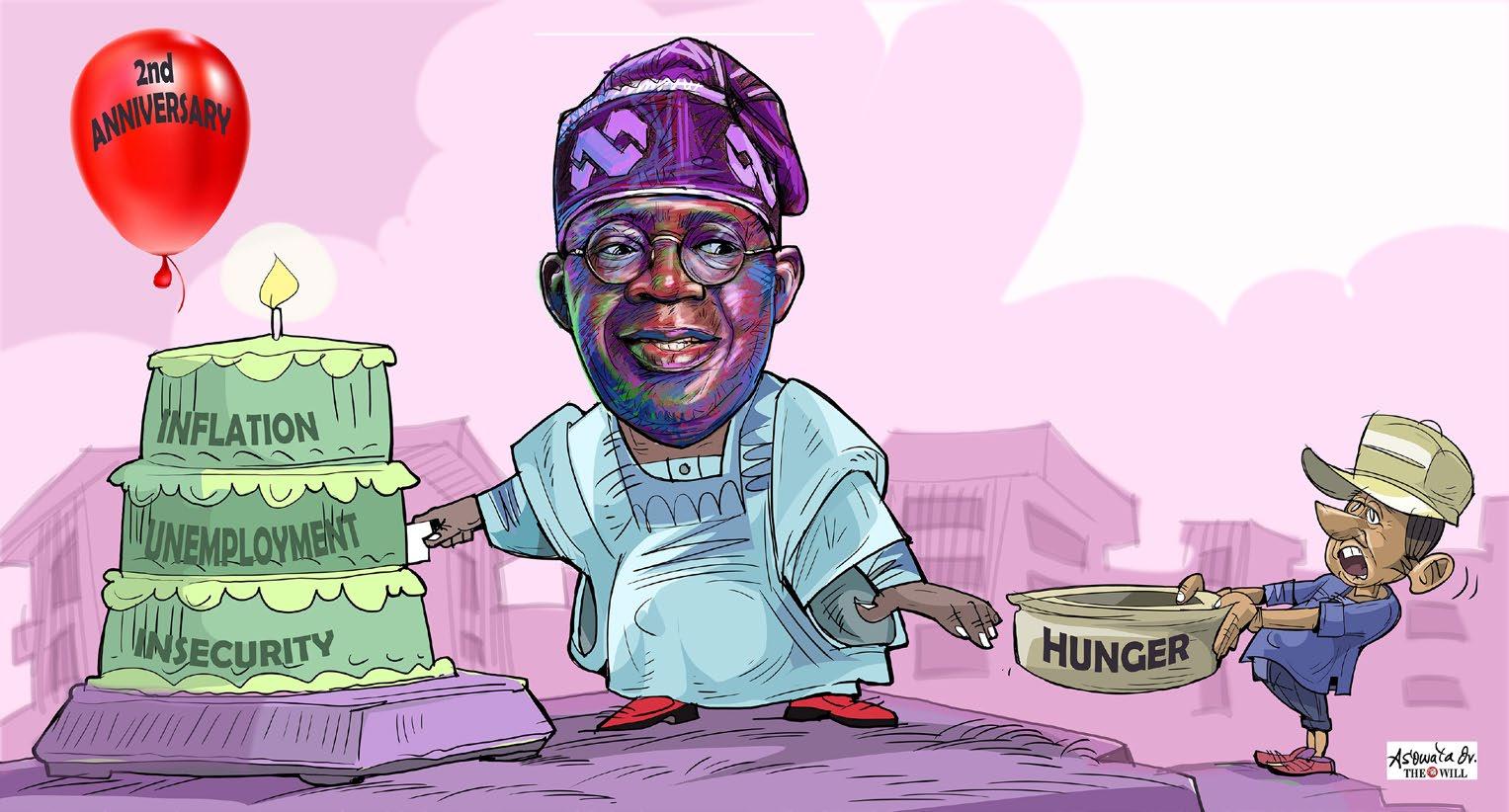
On Thursday, May 29, 2025, the Bola Ahmed Tinubu Administration would have completed two years in office. That is, two years shy of his constitutionally mandated four-year tenure.
During his inauguration on May 29, 2023, the President unveiled a policy framework named Renewed Hope Agenda, with key areas of focus as defence and internal security, job creation, macro-economic stability, improved investment environment, human capital development, poverty reduction, and social security. Not much was accomplished in the President’s first one year in office, thereby compelling him to reshuffle his cabinet for the purpose of injecting capable hands and fresh ideas in September 2024.
Seven new ministers were employed to replace those sacked, while three were redeployed. The seven ministers are Bianca Ojukwu (State, Foreign Affairs); Dr Nentawe Yilwatda (replaced suspended Betta Edu as Minister of Humanitarian, Affairs and Poverty Reduction); Muhammadu Maigari Dingyadi (Labour and Employment); and Dr Jumoke Oduwole (Industry, Trade and Investment). Others are Idi Mukhtar Maiha (Livestock Development), Yusuf Abdullahi Ata (State, Housing and Urban Development); and Suwaiba Said Ahmad (State, Education).
The six that were redeployed are Dr. Yusuf Tanko Sununu, former Minister of State, Education, redeployed as Minister of State, Humanitarian Affairs and Poverty Reduction; Dr. Morufu Olatunji Alausa, Minister of State, Health, now Minister of Education; Bello Muhammad Goronyo, Minister of State, Water Resources and Sanitation, now Minister of State for Works.
elected on the platform of the governing All Progressives Congress, APC, and some sympathisers in the opposition Peoples Democratic Party, PDP, notably the three Senators from Osun State - Senator Kamarudeen Oyewumi (Osun West), Senator Olubiyi Ajagunla (Osun Central), and Senator Francis Fadahunsi (Osun East).
At the one-day APC summit with the theme “Renewed Hope Agenda: The Journey So Far,” held at the Banquet Hall, State House, Abuja, last Thursday, Minister of Information and National Orientation, Idris Mohammed summarised the government’s success story so far. According to Idris, President Tinubu remains committed to transforming Nigeria through the Renewed Hope Agenda, which he described as a bold, people-first blueprint that is turning obstacles into opportunities.
“The Renewed Hope Agenda is about positively impacting the lives of the people of Nigeria, through bold decisions designed to unleash the full scale of Nigeria’s potential, in a way that has never been seen or done before”, he said.
Idris recalled that President Tinubu inherited a nation at a crossroads and immediately moved with clarity and courage. “Among the first decisions the President made were the removal of petrol and foreign exchange subsidies, which have been amongst the biggest impediments to Nigeria’s progress, costing us billions of dollars in losses and waste annually.”
The minister noted that “true leadership involves the ability to make decisions that might be tough in the short term but are guaranteed to deliver lasting returns.”
chose some critical areas that govern the lives of Nigerians. They are roughly Security, Power, Governance and Inflation.
SHINING STARS IN GOVERNMENT
Some appointees of President Tinubu have been doing remarkably well and earning accolades for their outstanding service. Minister of Aviation and Aerospace Development, Festus Keyamo, SAN, “whose exceptional leadership, bold reforms and tireless dedication to service has repositioned Nigeria’s aviation sector as a beacon of excellence across Africa,” according to the Airline Operators of Nigeria, AON, congratulating him on his recent appointment as Chairman of the Council of Ministers of the Banjul Accord Group (BAG)—a coalition of seven West African countries committed to the advancement of civil aviation in the sub-region. Minister of Interior, Olubunmi Tunji-Ojo, Minister of Works, Dave Umahi, Minister of the FCT, Nyesom Wike, Minister of Solid Minerals Development, Dele Alake, Minister of Communications, Innovation and Digital economy, Bosun Tijani and Minister of Health, Muhammad Ali Pate.
GOVERNANCE AND INFLATION
While the numbers point to “substantial progress”, the impact has left most Nigerians in severe hardship and poverty. Political Economy professor at the University of Lagos, Sylvester Odion Akhaine, told THEWILL on Thursday that the Federal Government has set some major reforms that may transform the fiscal landscape for good but must revise other measures that may prove counterproductive.

Others are Abubakar Momoh, former Minister of Niger Delta Development, now Minister of Regional Development; Uba Maigari Ahmadu, Minister of State Steel Development, now Minister of State, Regional Development; and Dr. Doris Uzoka-Anite, Minister of Industry, Trade and Investment, now Minister of State, Finance.
OFFICIAL VIEW
Expectedly, the government has given itself a pass mark with a crowning moment involving the endorsement of President Bola Tinubu as the sole candidate of the party in the forthcoming 2027 General Election, by governors and lawmakers

THEWILL EDITORS’ VERDICT
We believe that two years in the life of this government which promised to renew the hope of Nigerians through sectoral reforms calls for a mid-term assessment that serves as a measure of how Nigerians are faring under the administration. How has the federal government’s policies impacted the lives of Nigerians in these past two years and what are the opportunities out there for citizens?
These are the questions that prompted THEWILL Editor’s decision to embark on this assessment of the Tinubu administration. In making this review, we
“The tax reform, in my opinion, is ambitious. If truly implemented, it will turn out to be the most far-reaching fiscal policy ever. Two, the war against terror peaked initially, but there is a resurgence. The President needs to double down with clear objectives,” he said, adding that, “There is a slide towards authoritarianism. Such laws aiming to scrutinise social media are counterproductive to the tenets of liberal democracy. He should revise the trend and entrench freedom of expression and association.”
Similarly, the monetary policy authorities have been celebrating the gains of economic reforms resulting in macroeconomic stability. In the words of Dr. Olayemi Cardoso, Governor of the Central Bank of Nigeria, “Our foreign reserves
now exceed $38 billion, providing nearly ten months of import cover”. Furthermore, “In 2024, Nigeria recorded a balance of payments surplus of $6.83 billion, the strongest in many years, driven by rising exports and renewed capital inflows. Nigeria is increasingly recognised as a rising economic force, admired for the resolve shown in implementing difficult but necessary reforms”.
Some outlooks add to this euphoria: oil production is at 1.6mbpd as against 1.18 mbpd prior to President Tinubu’s inauguration. The NGX market capitalisation which stood at N30.36 trillion has jumped to N68.75 trillion. Nonetheless, the verdict is still stark. The World Bank has said that nearly half of Nigeria’s population is now living in poverty as inflation continues to outrun the purchasing power of the country’s minimum wage.
This was stated in the World Bank’s May 2025 Nigeria Development Update (NDU), released in Abuja on Friday, May 21, 2025, disclosing that 46 percent of Nigerians, about 107 million people, were living below the international poverty line of $2.15 per day in 2024, even as the country boasts of being Africa’s largest economy Nigerians are bleeding profusely from the injuries inflicted by the removal of fuel subsidy which pushed the pump price of petrol from N230 per litre in May 2023 to N880 per litre in May 2025. Additionally, the naira dropped from N467/US1 on the official window in May 2023 to N1,600/US$1 as of May 2025.
There is no doubt that PMS, diesel and other fuels that drive the economy are available because of the removal of petrol subsidy but the price being paid by Nigerians as a result is affecting their livelihood daily. Transportation fare has risen progressively in the past two years and cost of living too has skyrocketed.
For example, bus fares from Lagos to Abuja have increased from N8,000 two years ago to N55,000, an increase of over 600 percent. Lagos to Benin has increased from N3000 to N25,000 about 700 percent increase and Lagos to Owerri has increased from N27,000 to N55,000, a 100 per cent increase. As an economy that relies on oil and petroleum products, the impact of this increase on inflation has been devastating for many households. Fair enough, the government last year signed the Minimum Wage Act, 2024 into law, increasing the minimum wage to N70,000. But as at May 25, 2025, 20 out of 36 states have commenced payment of the new wage and many are yet to implement the payment across board.
Nigeria Union of Local Government Employees, Alhaji Haruna Kankara, told THEWILL in a recent interview that about 20 states have yet to implement the N70,000 new minimum wage for local government workers and primary school teachers. He said that the government was playing politics with the wage increase, while saying that the union will continue to dialogue with the Ministry of Finance, the Attorney-General of the Federation and the Central Bank to resolve the issue.
A Lagos State teacher, who gave her name as Mercy Akiefa confided in this newspaper that the “new wage is insufficient to cater for transportation and proper feeding let alone pay school fees and health care.” The Federal Government of Nigeria implemented a rice subsidy program to provide 50kg bags of rice to states at a subsidized price of N40,000 per bag. This initiative aims to address rising food costs and food insecurity in the country and is still to address the hunger in the land. The Compressed Natural Gas, CNG initiative that government introduced as alternative source of energy was initially hailed as good, but the cost of installation and easy availability of filing stations has made it slow to adopt.
Moreover, the national debt burden of N77 trillion in May 2023 has risen to N142 trillion with a huge impact on the fragile economy as an average of $500 million is used to service the nation’s debt per month. Speaking at the 15th Alpha Morgan Economic Review Webinar on Wednesday, May 21, the CEO of Financial Derivatives, Bismark Rewane, stated that while reasonable stability has been achieved in the economy, Nigerians should brace for tougher days ahead arising from high cost of energy, devaluation of the naira and impact of insecurity. Tilewa Adebajo, CEO of the CFG Advisory, said that the outcomes from the reforms taken by Nigeria in the last 18 months has caused significant hardship at the micro level, stressing that the right policies must be put in place to help grow the economy at a sustainable level. Nigeria’s current 3.83 per cent GDP growth, although higher than 2.31 per cent recorded in 2023, is a far cry from what is needed to boost the economy into productivity.
large swathes of the country, particularly in the Northeast states of Borno and Yobe State, almost all the seven states in the Northwest, particularly Zamfara, Kaduna, Katsina, Sokoto and Kebbi as well as Niger, Benue and Plateau in the Northcentral geo-political zones are still bleeding from bloodshed in huge numbers. What is worse, farming and business activities have been negatively impacted by the activities of the daredevils.
Even soldiers have become targets of the terrorists. Ransom payments by Nigerians have also increased. The National Bureau of Statistics (NBS) reported that in Nigeria, between May 2023 and April 2024, over 614,937 deaths were recorded due to insecurity. Additionally, 2,235,954 Nigerians were kidnapped, and a total of N2.23 trillion was paid in ransom. It is arguable if there has been significant improvement, one year after.
In fact, Borno State governor, Babagana Zulum painted a sad picture last week when he claimed that internal saboteurs that act as “informants and collaborators within the Nigerian Armed Forces, within the political class, and within local communities”, have sabotaged the war against insecurity. Given that the constitutional mandate of any Nigerian government is the protection of the people and the provision for their welfare, THEWILL Editors strongly believe that the government needs to demonstrate capacity and capability to protect the citizenry. As an urgent measure to tame insecurity, political, religious and traditional rulers from all the geo-political zones in the country have agreed with the intention of the President and governors to introduce state police. What is holding the government back?
According to the National Bureau of Statistics, electricity supply was 5,909.83GWh in Q2 2023 but dropped to 5,769.52GWh in Q1 2024; 5,612.52GWh in Q2 2024 and 5,713.60 GWh in Q1 2025. Surprisingly, the government appears helpless in tackling the electricity challenge. For a government that has tried to manage electricity through measures like the classification of consumers into bands based on ability to pay and the recent new initiative to power Aso Rock from massive solar installation, speak to the frustration of the government to remedy the situation.
Speaking at a two-day retreat organised by the Senate Committee on Power last week, the Minister of Power, Adebayo Adelabu, said that “chronic underinvestment in distribution infrastructure has continued to cripple service delivery nationwide despite landmark reforms in the electricity sector.” He blamed the Distribution Companies, DISCOS, for frustrating all the gains the government has made in the power sector, saying “they have disappointed the government with poor performance.” A major player in the electricity sector, Tony Elumelu, also the Chairman of Heirs Holdings, said that stable electricity and improved security are critical keys to attracting investments to Nigeria.
Elumelu, who spoke last Wednesday at the Taraba International Investment Summit in Jalingo, organised by the Taraba State government, said, “Improving access to electricity is so critical in attracting and supporting investments in the country. Improving the security also helps, and most importantly, ease of doing business.” Government should therefore think out of the box on this obviously vital factor in economic development and generate the required political will to resolve the infrastructural deficit in electricity supply because without an efficient and effective power supply, Nigeria’s productive and manufacturing capacity may stagnate.
Infrastructure constraints across the entire value chain from fuel to power distribution link, including insufficient gas pipelines, obsolete generation plants, and equipment, as well as inadequate and poorly maintained transmission and distribution networks should be the focus in the next two years of the administration. A new world of technology such as AI, robotics, coding, machine use and transfer of technology to Africa depends on electricity. Nigeria has abundant and varied means of generating electricity, namely solar, water and wind. These are areas waiting for massive investments.
VIEWS FROM ACROSS THE STATES
Recounting the terrible insecurity situation in Benue state, which appears to have defied intervention, the Tiv Traditional Council led by James Ortese Iorzua Ayatse issued a directive, ordering herders to vacate farmlands across the Tiv Kingdom, to allow for full-scale resumption of farming activities. The affected
areas include Kwande, Katsina-Ala, Logo, Ukum, Guma, Makurdi, Gwer West, Gwer East, and Buruku.
Speaking to our correspondent in Makurdi on Friday, several farmers, including the State Coordinator of Sustainable Agriculture in Benue, Mr. Aondona Saaku, said the directive is timely, given the threat posed to food security by the continued occupation of farmlands by herders.
Saaku said the move was in the best interest of both parties and urged herders to comply with the order to avoid further tensions in the affected communities. “This directive is timely and necessary. If the herders vacate these lands peacefully, everyone stands to benefit. Farmers will return to their fields, and herders can seek alternatives without conflict,” he said. He added that many Benue farmers had been displaced and forced into Internally Displaced Persons, IDP, camps due to violent attacks by invading herders, many of whom, he claimed, do not even speak the Fulani language familiar to residents.
Saaku, a former State Chairman of the All Farmers Association of Nigeria (AFAN), also noted that Benue farmers have historically practiced ranching, especially during the rainy season, and called on the herders to comply with the eviction directive.
Similarly, a member of the Association of United Farmers Benue Valley (AUFBV), Mr. John Upulugh, commended the Tiv Traditional Council for what he described as a long-overdue intervention. He noted that the Tiv people in Benue, Nasarawa, and Taraba states had been displaced from their ancestral lands over the years due to herder-related attacks, which has prevented them from farming.
Responding to a question from Headquarters Operation Whirl Stroke (OPWS) need to be expanded to cover the entire state, including the deployment of mobile police men in strategic locations with intensified military-led joint task force operations targeting bandits, kidnappers and other criminal elements in Benue, especially in border communities and neighbouring states, would greatly checkmate the insecurity problems in the state.
According to him, forward Operating Bases that have also been established in conflict-prone areas of Agatu, Ohimini, Guma, Logo, Katsina-Ala, and Ukum would go a long way to deter and reduce the spate of attacks.
Comrade Yinka Folarin, the National Vice President, Committee for the Defence Human Rights (CDHR), told being federal government.”
He said the President has taken some bold steps to restructure the state and to ensure that the country is restored to its old glory of security and much better standard of living, but “To a very large untold hardship, many lives have been lost as a result and some of the problems inherited by the current government are still very much in existence - the insecurity, the economic situation and poor standards of living of the masses. He has got a lot to do two years down the line, and I want to be optimistic by saying that things will get better.”
Peter Oluwatoyin Adekunle, Capon, Ash Montana Deck, Abeokuta Chapter of the National Association of Seadogs ‘Pyrates Confraternity told the government’s claim of performance contradicts realities in the lives of many Nigerians.
“Public sentiment, as reflected in surveys like the National Bureau of Statistics which said food inflation is as high as 40 percent and 84 percent of citizens expressing dissatisfaction in a 2024 Africa Polling Institute (API) survey as well as X posts, show public frustration with the lack of tangible improvement,” he said, adding that, “The removal of subsidies and floating of the naira, while aimed at long-term economic stability, have not been accompanied by sufficient measures to cushion immediate impacts, leading to widespread discontent.”
The major problem, he further said, was that economic reforms have prioritized long-term goals over immediate relief, leaving most Nigerians struggling. That is why “the administration’s focus on macroeconomic indicators has not yet translated into tangible improvements in living standards.”

Coupled with these challenges crying for urgent attention, is the mounting insecurity which has claimed thousands of lives since 2023 and displaced hundreds of communities across the country, especially in the food producing Middle Belt region. However, the deliberate intervention of government in the petrol price war between the Nigeria National Petroleum Company Limited, NNPCL, and Dangote’s refinery and the presidential directive for the later to pay for supply of crude oil in naira, which has restored regular supply of PMS, is praiseworthy. It shows what can be done with the right political will.
Moreover, the government has also scored some achievement in managing to get NNPC refineries back to production, no matter how skeletal and opaque their production volume is today. As part of measures to empower the sector to deliver improved services, the President sacked the Mele Kyari led management of the NNPCL and appointed a new management led by Bayo Ojulari, a respected multinational oil executive.
INSECURITY
Despite regular information released by the Defence Headquarters about the impending defeat of terrorists, insurgents and bandit, the fact remain that
“ Among the first decisions the President made were the removal of petrol and foreign exchange subsidies, which have been amongst the biggest impediments to Nigeria’s progress, costing us billions of dollars in losses and waste annually

Last week the various groups within the governing APC fell over one another to endorse the President as the sole candidate of the party in the 2027 general election. The groups are the Progressives Governors Forum led by Governor Hope Uzodinma of Imo State, senior lawmakers elected on the platform of the party and the members of the National Working Committee led by National Chairman, Abdullahi Ganduje.
While the party members and officials have the right to endorse the President for a second term, we believe that two years is still a long time for the administration that is yet to achieve a substantial part of the promises it made to the electorate on assumption of office in 2023. It will prove a great distraction to the President if sycophancy and politicking for an election that is still two years away take centre stage barely two years in the life of the administration.
As Professor Akhaine rightly noted in an interview with “Unfortunately in the next two years, it is going to be politics and politics. That may affect social policies. So, the President should rather refocus on resolving basic infrastructure problems.” Going forward he said, the government must tackle head on the “Debilitating poverty made worse by terrorists roaming our forests and making farming difficult.



L-R: Registrar, Joint Admissions and Matriculation Board (JAMB), Prof. Is-haq Oloyede; former Vice Chancellor, National Open University, Prof. Vincent Tenebe; Vice-Chancellor, Northwest University, Kano, Prof. Mukhtar Kurawa and Vice-Chancellor, Usmanu Danfodiyo University, Sokoto State, Prof. Bashiru Garba, during a stakeholders’ meeting on the just concluded 2025 rescheduled UTME results in Abuja on May 21, 2025.
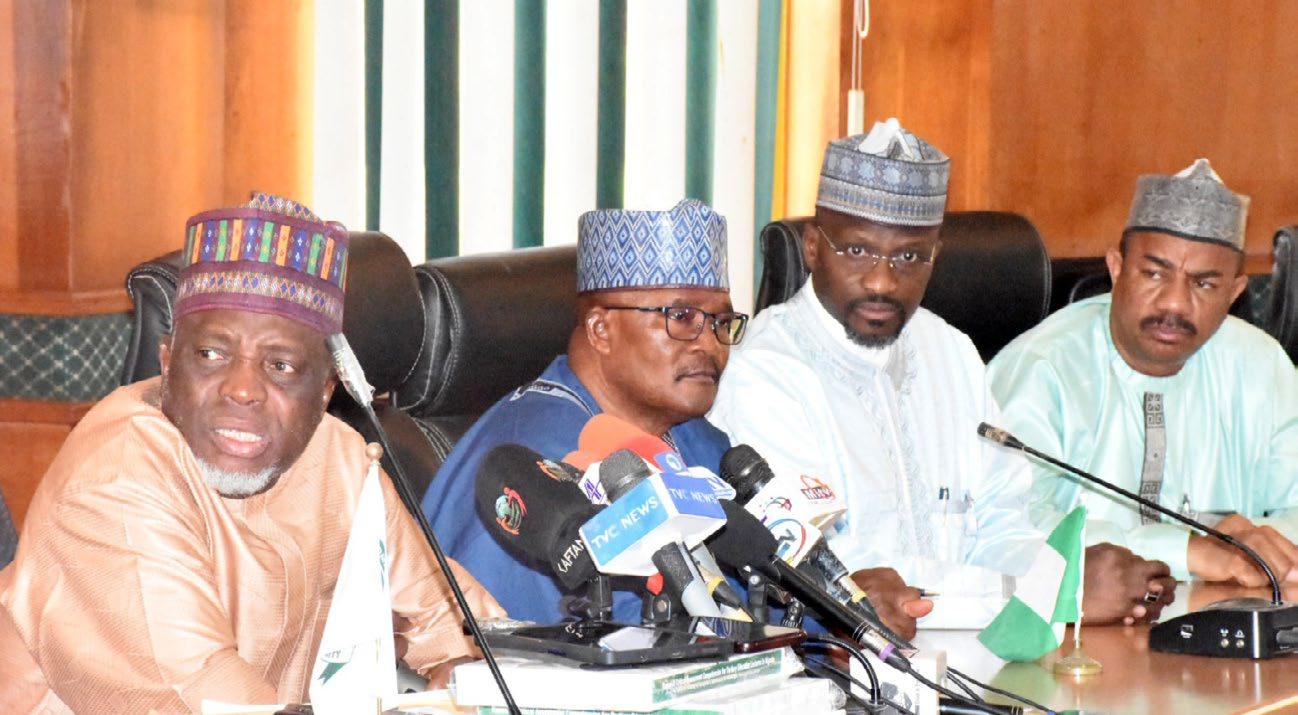


he Nigeria Customs Service (NCS) has recorded an unprecedented revenue of N1.3 trillion in the first quarter of 2025, more than double the N600 billion collected during the same period in 2023.
Comptroller-General of Customs Bashir Adewale Adeniyi attributed this remarkable growth to transformative reforms under President Bola Tinubu’s Renewed Hope Agenda, as revealed in an upcoming State House documentary marking the President’s second anniversary.
Adeniyi highlighted that the revenue surge emanated from improved technological deployment, enhanced port operations, tightened enforcement on revenue leakages, and a renewed culture of accountability across Customs commands.
“We collected N1.3 trillion in Q1 2025 alone. This is not due to higher import volumes. Imports have dropped due to foreign exchange constraints. What has changed is efficiency, transparency, and enforcement,” the Comptroller-General said. He disclosed that the Service is preparing to launch the E-Customs Modernisation Project. This $3.2 billion initiative will digitise cargo processing, surveillance, and payment systems across Nigeria’s ports and borders.
“We’re laying the foundation to move from a manual, paperbased system to a fully digital service. The E-Customs Project is central to our future. Once fully deployed, we project it will add $250 billion in cumulative revenue over 20 years,” he said.
Adeniyi added that the newly launched Authorised Economic Operator (AEO) Programme is now onboarding pre-vetted importers, allowing compliant businesses faster processing and reducing port congestion.
“It’s about trust and efficiency. If you’re compliant, you get green-lane treatment. This is how modern customs systems work globally,” he said.
The Customs CG confirmed that the Service has intensified its anti-smuggling operations and closed long-standing revenue leakages.
He said over N64 billion was recovered from previously underassessed or undervalued imports in the last nine months, and major smuggling rings at the Seme, Idiroko, Katsina, and Sokoto borders have been dismantled.
He said the new joint border patrol task forces established in coordination with the Nigerian Army, DSS, and Police have also yielded positive results.
“We’re no longer just chasing smugglers in the bush. We’re using data, surveillance drones, and port intelligence to act in real-time. Once systemic leakages are now being plugged,” “ Adeniyi said. To ease trade and reduce business costs, Adeniyi disclosed that NCS is fast-tracking the roll-out of the National Single Window. This digital portal will integrate all government agencies involved in cargo clearance.
“Right now, you deal with up to 15 agencies manually. With the Single Window, you’ll do it all online, in one place. This will slash clearance time and costs,” the CG explained, adding that clearance timelines at Apapa and Tin Can Ports have already dropped from 21 days to 7–10 days for compliant importers.
The Comptroller-General said the agency has introduced fasttrack lanes for agro-exports and is working with the Nigerian Export Promotion Council (NEPC) to streamline outbound cargo processes in line with the government’s push for non-oil exports.
“We’re promoting exports aggressively. Last year, Nigeria exported over N340 billion worth of solid minerals and agro commodities through formal channels, up by 38%. We’re targeting even more in 2025,” he said.
He stated that the Customs Service is also undergoing internal transformation, with over 1,800 officers trained in advanced data analytics, risk profiling, and artificial intelligence.
“Customs is no longer just about physical inspection. We are becoming an intelligence-led organisation, and our officers are being retrained to match global standards,” Adeniyi said.
“The President gave us a clear directive: block leakages, facilitate trade, and raise revenue without burdening Nigerians. That is what we are doing. And the results are beginning to speak for themselves.”
FROM JOSEPH AMEDU, LOKOJA
International
Federation of Women Lawyers (FIDA) Nigeria has called for collaboration with relevant global organisations in advancing women’s inclusion and representation in leadership and Political Processes in Nigeria.
Country Vice President of FIDA, Nigeria, Mrs Eliana Martins made the call while declaring open a-oneday Advocacy/Town hall Meeting for Kogi West Senatorial District, held in Lokoja on Friday.
Country Vice President of FIDA, Nigeria who was represented by the Kogi State FIDA Chairperson, Oluwakemi Omeiza Usman, disclosed that the Advocacy/Town hall Meeting was put in place by FIDA in partnership with the United Kingdom International Development and United Nations Women towards Advancing Women’s Participation in Leadership and Politics.
“This gathering is also aimed at building consensus and consolidating memoranda to be presented to the constitutional reform committee during zonal public hearings

“Our focus in this meeting is to solicit support for a bill that will create reserved or special seats for women at both state and national assemblies under the proposed constitutional amendments in Nigeria
“The bill will increase women’s participation in decision making, give women the opportunity to represent themselves critically and provide diverse perspective in decision making”
Mrs Eliana Martins then called for necessary support from all quarters to ensure that the bill scale through
She also called for gender equality in the scheme of things and warned against undue marginalisation of women in any form
“Women’s rights and that of the vulnerable groups should as well be respected by government at all levels, organisations and individuals
“I therefore, encourage every participant at this forum to be actively engaged in achieving the desired goal of advancing the course of women in Nigeria. ”

BY FELIX IFIJEH
Nigeria’s Chief of Army Staff, Lt.-Gen. Olufemi Oluyede, on Friday charged military commanders and frontline troops to deal decisively with terrorists and other criminal elements threatening the country’s peace, declaring that no mercy should be shown in the battle to restore order.
Oluyede issued the directive at the closing ceremony of the Nigerian Army’s First Biannual Conference held in Maiduguri, Borno State. The three-day event brought together top-ranking military officers who deliberated on strategies to enhance national security and stability.
Reaffirming the Army’s commitment to wiping out insurgents and restoring peace, Oluyede stated:“Ladies and gentlemen, there is no contesting our decision to completely neutralise these detractors of peace. I charge every officer and soldier to spare no quarter in running these terrorists and criminals to the ground. They seek to disrupt our way of life and destroy the society our forefathers built. We will not allow that to happen.”
The Army Chief hinted at a series of operational reinforcements, noting that new combat enablers would be inducted into ongoing missions in the coming weeks.
However, he stressed that the Army’s true strength lies not in weaponry, but in the courage and discipline of its personnel.
He said: “We must understand that the strength of the Nigerian Army does not lie solely in the weapons we place on the battlefield, but in the will of the soldiers who wield them.
“It is the responsibility of everyone here to show exemplary leadership and mentor the next generation of officers.”
He noted that the Army faces an adversary determined to tear apart the country’s social and cultural fabric, and called for unwavering commitment from officers at all levels.
Reflecting on the outcome of the conference, Oluyede praised the depth of discussions and the strategic foresight demonstrated by participants.
“The clarity of thought and quality of contributions exceeded my expectations. The objective of this first Biannual Conference has largely been achieved. We will take concrete steps to implement the recommended measures in our ongoing and future operations,” he said.
The Airline Operators of Nigeria (AON) extends its heartfelt congratulations to the Honourable Minister of Aviation and Aerospace Development, Mr Festus Keyamo, SAN, CON, FCIArb (UK), on his recent appointment as Chairman of the Council of Ministers of the Banjul Accord Group (BAG)—a coalition of seven West African countries committed to the advancement of civil aviation in the subregion.
This remarkable appointment is a testament to the Honourable Minister’s exceptional leadership, bold reforms, and tireless dedication to repositioning Nigeria’s aviation sector as a beacon of excellence across Africa. It further affirms Nigeria’s growing influence in shaping the future of aviation on the continent and globally.
Since assuming office, Mr Keyamo has championed far-reaching reforms that have revitalised the aviation industry. These include a revised regulatory framework for leased aircraft insurance and ensuring Nigeria’s proactive engagement with the global Aviation Working Group. His efforts have significantly improved investor confidence, aircraft financing options, and the ease of doing business for Indigenous operators.
Under his stewardship, Nigerian airlines have achieved new milestones, including the historic Lagos-to-London flight by Air Peace and Nigeria’s strategic participation at the prestigious
Aviation Finance Conference in Dublin, both historic feats that have placed the nation firmly on the global aviation map. Minister Keyamo’s commitment to safety, efficiency, and sustainable growth is evident in his continuous push for infrastructure investment and his successful advocacy for the Cape Town Convention’s full implementation moves that have enhanced Nigeria’s international aviation standing.
As we celebrate this milestone, AON also extends its profound gratitude to President Bola Ahmed Tinubu, GCFR, for his visionary leadership and for consistently demonstrating an exceptional ability to put round pegs in round holes. The appointment of Festus Keyamo, SAN, is proof that when competent hands are entrusted with responsibility, the results speak for themselves. Under the Renewed Hope Agenda, Nigeria’s aviation industry is experiencing a golden era of policy clarity, institutional reforms, and global relevance unparalleled in over two decades.
The AON is confident that Minister Keyamo will bring the same level of innovation, excellence, and dedication to his new role at the BAG Council of Ministers, advancing regional cooperation and driving sustainable aviation development across West Africa.
Once again, congratulations to our Honourable Minister. The skies are indeed brighter with your leadership.

BY ANTHONY AWUNOR
The Nigerian Safety Investigation Bureau (NSIB) has launched an investigation into the crash-landing of a Diamond training aircraft operated by the Aviation Training School in Ilorin.
The incident, which occurred at 5:28p.m. local time on Thursday, May 23, 2025, happened during a simulated instrument approach on Runway 05 of the Ilorin International Airport. In a statement issued on Friday, the Director of Public Affairs and Family Assistance at the NSIB, Mrs Bimbo Olawumi Oladeji, said the aircraft veered off the runway and came to a stop on the grass verge.
There were two occupants on board. Both sustained serious injuries and were promptly evacuated to a medical facility through the coordination of the Nigerian Airspace Management Agency (NAMA).
Following the incident, the Bureau has deployed its Go-Team from Abuja to Ilorin to begin an on-site investigation.
Oladeji said the team would secure the crash site, collect physical evidence, interview witnesses, and retrieve operational data in order to determine the causes and contributing factors of the incident.
Reacting to the incident, the Director-General of NSIB, Alex Badeh Jr., expressed sympathy for the injured and commended the emergency response efforts.
“Our thoughts are with the injured, and we commend the swift medical and emergency response. Now, our focus is on understanding exactly what went wrong. Every investigation is an opportunity to improve safety,” he said.
The Bureau urged the public and media to refrain from speculation and wait for verified updates as the investigation unfolds.
“NSIB remains committed to a thorough, independent, and professional investigation that contributes to ongoing efforts to enhance aviation safety in Nigeria,” the statement added.

BY ANTHONY AWUNOR
The Managing Director of the Federal Airports Authority of Nigeria (FAAN), Mrs Olubunmi Kuku, has hailed the transformative role of the private sector in reshaping Nigeria’s aviation industry, citing the emergence of carriers like Air Peace and Arik Air as a game changer.
Kuku noted that at a time when the industry was facing uncertainty, private operators injected fresh capital, modern management practices, and a competitive spirit that revitalised the sector.
She made the remarks in Lagos on Friday at the launch of the book, “100 Years of Civil Aviation in Nigeria: History, Issues and Prospects”, authored by veteran aviation journalist, Wole Shadare.
“From our colonial beginnings to our current status as West Africa’s largest aviation market, every milestone tells a story of resilience, determination, and opportunity,” Kuku said.
She recalled that following Nigeria’s independence in 1960, the country struggled with converting colonial infrastructure into a fully sovereign aviation system. Although the national carrier, Nigeria Airways, emerged as an early attempt at independence in the sector, it was soon plagued by mismanagement and inefficiencies.
“By the early 2000s, we found ourselves at a crossroads—
adapt or risk obsolescence. That turning point triggered a wave of transformation. Companies like Air Peace and Arik Air did not just step in to fill a gap—they revolutionised our aviation landscape,” she said.
Highlighting the sector’s current trajectory, the FAAN boss stated that Nigeria now boasts 39 certified airline operators, 31 airports across the country, over 2,100 licensed pilots, and a robust workforce that includes engineers, technicians, and air traffic controllers.
She noted that the aviation sector now contributes approximately $1.7 billion to Nigeria’s GDP, positioning it as a clear example of the power of market-driven reforms.
While acknowledging challenges such as infrastructural gaps, regulatory bottlenecks, and financing needs, Kuku said these hurdles also present investment opportunities.
She lauded Shadare for his work in chronicling Nigeria’s aviation history, adding that the future of the industry lies in the hands of those who see the skies not just as flight paths but as “highways to prosperity.”
“The question is no longer whether to invest in Nigerian aviation, but how best to be part of this transformative journey,” she concluded.
BY LADI DAPSON, MAIDUGURI
Nigerian troops have repelled an attack by Boko Haram/ Islamic State West Africa Province fighters on its formation, where at least 16 of them were killed after gun battles.
The attack occurred around 12:00- 3:00 a.m on Friday when the terrorists stormed Taskforce Brigade in Damboa town. The terrorists fired multiple RPGs into the town, targeting a military base. A source in Damboa, who spoke anonymously to our reporter said troops of the Operation Hadin Kai, who resisted the RPGs, responded after leaving the terrorists

to exhaust their firepower. “Air support was deployed, and after two hours of combat, the insurgents fled with heavy casualties”, the source said.
A post by the Nigerian military officials has earlier confirmed 16 fighters were killed, and that troops are pursuing the remaining terrorists who scampered to the bush with gunshots wounds.
The military added that an ammunition storage area was damaged, but the fire was contained, and no civilian casualties were reported.
BY AMOS OKIOMA
The Presidential Amnesty Programme (PAP) Phase 2 ex-agitators have strongly condemned a recent online publication by a faceless group of aggrieved agitators, which issued a warning to the PAP Administrator, Dr Dennis Burutu Otuaro.
Describing the publication as a calculated attempt to distract and blackmail the administrator, the national chairman, Ibena Rufus Salvation, reaffirmed the support of genuine ex-agitators across the Niger Delta for Otuaro’s leadership.
Ibena labelled the group’s statement as misleading and self-serving, stating that “no true beneficiary of the amnesty programme would work against the progress currently being recorded under Otuaro.”
He cautioned individuals making threats under the guise of seeking justice, stressing that no one has the right to disrupt the peace in the Niger Delta. He said anyone with genuine concerns should use proper channels to engage, rather than resorting to threats and blackmail.
He maintained that the Amnesty Programme under Otuaro remains focused on peace, progress, and inclusion, and warned that any attempt to destabilise the region will be strongly resisted.
“We won’t sit back and watch anyone threaten the peace of the Niger Delta for selfish reasons. No one has the right to hold the region to ransom under the guise of seeking justice. If anyone has genuine concerns, the proper channel is dialogue, not threats. Chief Dr Dennis Otuaro is committed to peace and progress, and we will not allow any faceless group to destabilise the gains we’ve made in the Amnesty Programme”, he said.
The national chairman made it clear that any attempt to malign the reputation of the administrator or derail the peace and reintegration process would not be tolerated.
“We issue a final warning to Owoupele Energie Owous and his faceless group, stop distracting the Administrator or be ready to face the law”, Ibena declared.
He highlighted the reforms and transparency being brought into the Amnesty Programme under Otuaro’s leadership, including empowerment, skills training, and prompt stipend payment.
He urged all genuine ex-agitators and stakeholders to remain focused and ignore divisive elements whose only agenda is to frustrate progress for personal gain.
L-R: Governing Council member of the Chartered Risk Management Institute (CRMI), Mrs Augusta Ehighalna; First Vice President, CRMI, Mr. Kevin Ugwuoke; Director General, National Emergency Management Agency (NEMA), Mrs. Zubaida Umar; President of CRMI, Professor Ezekiel Oseni; CRMI Council member, Mrs. Olubanke Akanni and CRMI Registrar, Dr. Victor Olannye, during the courtesy visit of the CRMI Governing Council members to NEMA Headquarters in Abuja on May 20, 2025.
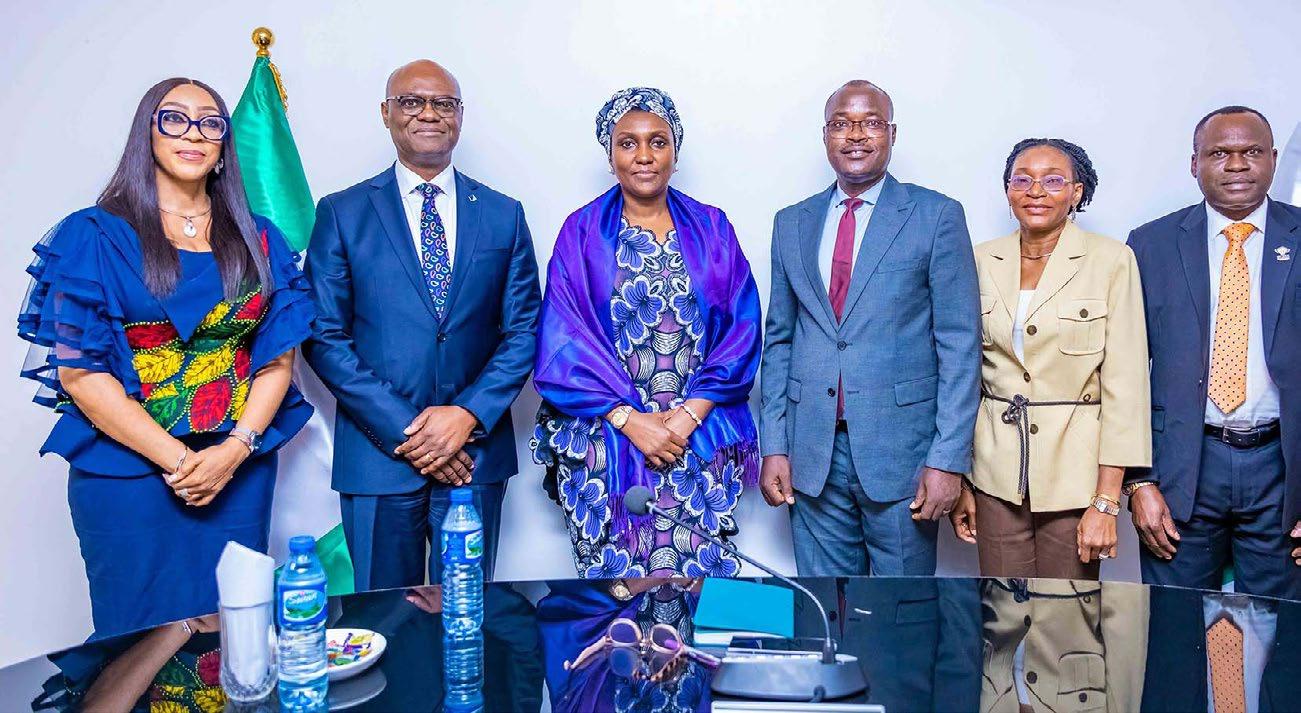
BY FELIX IFIJEH
Former Kogi governor, Yahaya Bello, has urged Nigerians to disregard a misleading viral video on social media, insinuating his plan to run for presidency in the 2027 general elections. Bello made this known in a press statement issued on Friday, by Ohiare Michae, the Director of Yahaya Bello Media Office.
The statement read: “Our attention has been drawn to another senseless post by mischief makers, who have no other job than to fabricate falsehood and disseminate same to mislead unsuspecting Nigerians. “They have tried so hard in their “bring-him-down-at-all-costs” mission against the immediate past Governor of Kogi State, His Excellency, Alhaji Yahaya Bello, but have always failed woefully.
“It is not the first time detractors and their co-travellers would fly absolute falsehood with the aim of setting the former governor against our President, President Bola Ahmed Tinubu.
“But this latest slant of reposting a 2022 rally afresh and insinuating that it is just happening, connotes nothing but insanity.
“Nigerians should be wary of witless bloggers who concoct stories without thinking, just to satisfy the interests of their equally brainless paymasters.
“In their desperate bid to create a crisis where there is none, they forgot the 2022 dates written boldly on the banners on display. “Yet, they expect reasonable people not to see this as the handiwork of frustrated detractors.
“While we state categorically that our principal, Bello, has no 2027 presidential ambition, we want to also stress his unflinching commitment to the re-election of President Tinubu come 2027.
“The indices cannot lie. The President and his team have done exceedingly well for the country, despite global challenges. On merit, he deserves the support of well-meaning Nigerians.
“Nigerians should disregard the mischievous post insinuating a fresh presidential support rally as what it is – a senseless post by a confused, witless mind “The fabricators forgot that the 2022 dates are boldly written on the banners on display. Yet, they expect reasonable people not to see this as the handiwork of detractors.
“But this latest slant of reposting a 2022 rally afresh and insinuating that it is just happening, connotes nothing but sheer mischief. “Nigerians should be wary of witless persons who concoct stories without thinking, just to satisfy the interests of their paymasters.”
Justice Yellin Bogoro of the Federal High Court sitting in Ikoyi, Lagos, at the weekend, convicted and sentenced twelve Filipinos to one year imprisonment each for cyberterrorism and internet fraud.
The convicts are: Anjeanette Topacio, Gladys Joy Mag-Iba, Jean Calago, Shairah Mae Reyes, Roseann Gonzales, Lari Jane Tayag, Mary Grace De La Cruz, Krystel Aquilesca, Jonilyn Agulto, Paizza Camara, Vivian Pionella and Jonalyn Mendoza
They were arraigned on Friday by the Lagos Zonal Directorate 1 of the Economic and Financial Crimes Commission, EFCC, on separate charges of possession of fraudulent documents.
One of the counts reads: “That you, Anjeanette Topacio, sometime in December 2024, in Lagos, within the jurisdiction of this Honorable Court, willfully caused to be accessed, computer systems organized to seriously destabilize and destroy the fundamental economic and social structure of Nigeria when you procured/employed Nigerian youths for identity theft and to hold themselves out as persons of foreign nationality, with the intent to gain a financial advantage for yourselves and you thereby committed an offence contrary to and punishable under Section 18 of the Cybercrimes (Prohibition, Prevention, Etc) Act, 2015 (As amended 2024) and Section 2(3)(d) of the Terrorism (Prevention, Prohibition) Act, 2022.”
The Lagos Zonal Directorate 1 of the Economic and Financial Crimes Commission, EFCC, on Friday, May 23, 2025, secured the conviction and sentence of Okoli Frank Emeka to six months imprisonment for mutilation of the Naira notes before Justice Chukwujekwu Aneke of the Federal High Court sitting in Ikoyi, Lagos.
The convict was arraigned on a one-count charge of tampering and matching on the Naira notes.
The charge reads: “That you, Okoli Frank Emeka, on the 18th day of August, 2024, at Al-moruf Garden, Isheri Olofin, Alimosho Local area of Lagos, within the jurisdiction of this Honourable Court, whilst matching on the Naira notes during a social occasion, tampered with the sum of N2,000, 000.00 (Two Million Naira) issued by the Central Bank of Nigeria, by matching on the same at the said occasion and you thereby committed an offence contrary to and punishable under Section 21(1) of the Central Bank Act,
2007.” He pleaded guilty to the charge when it was read to him. In view of his plea, prosecution counsel, Z.B. Atiku reviewed the facts of the case through Sa’id Sada Sani, an investigative officer with the EFCC.
In his evidence, Sani told the court that the Commission generated an intelligence-driven investigation on a trending video in relation to Naira mutilation.
He added that “ A surveillance was carried out, leading to the arrest of the defendant on May 15,2025.
“He was shown a video of him spraying the money and he made a statement regarding it.”
Consequently, the defendants’ extrajudicial statements and video recordings were tendered and admitted in evidence by the court.
Atiku, therefore, prayed the court to convict and sentence the defendant accordingly.


Another charge reads: “That you, Shairah May Reyes, sometime in December 2024, in Lagos within the jurisdiction of this Honorable court, had in your possession a document containing false pretense, printed from your Telegram, wherein you posed to be a lady, living in the UK , which representation you knew to be false, thereby committed an offence, contrary to Section 6 (8c) of the Advance Fee Fraud and other Fraud Related Offences Act, 2006 and punishable under section 1(3) of the same Act.”
They all pleaded “guilty” to the charges when they were read to them.
In view of their pleas, the prosecution counsel, N.K.Ukoha and H.U. Kofarnaisa, respectively requested that the court convict the defendants as charged, in accordance with the plea bargain they had entered into with the Commission. Justice Bogoro convicted and sentenced the defendants to one year imprisonment each, with a fine of N1,000,000.00 (One Million Naira).


L-R: Acting Deputy Commandant General, Nigeria Security and Civil Defence Corps (NSCDC), Dr. Eze Benito; Commandant General, NSCDC, Dr. Ahmed Abubakar Audi; Executive Vice President and Chief Executive Officer, IHS Nigeria, Mohamad Darwish and Director, Legal, IHS Nigeria, Yemisi Diya-Salawu, during the signing of MoU between IHS Nigeria and NSCDC, held at IHS Nigeria’s Corporate office on May 20, 2025.

BY KAJO MARTINS, MAKURDI
Across-section of farmers in Benue State has expressed support for the Tiv Traditional Council’s directive ordering herders to vacate farmlands across the Tiv Kingdom, to allow for full-scale resumption of farming activities.
Speaking to our correspondent in Makurdi on Friday, several farmers, including the State Coordinator of Sustainable Agriculture in Benue, Mr. Aondona Saaku, said the directive is timely, given the threat posed to food security by the continued occupation of farmlands by herders.
Saaku said the move was in the best interest of both parties and urged herders to comply with the order in order to avoid further tensions in the affected communities.
“This directive is timely and necessary. If the herders vacate these lands peacefully, everyone stands to benefit. Farmers will return to their fields, and herders can seek alternatives without conflict,” he said.
He added that many Benue farmers had been displaced and forced into Internally Displaced Persons (IDP) camps due to violent attacks by invading herders—many of whom, he claimed, do not even speak the Fulani language familiar to local residents.
Saaku, a former State Chairman of the All Farmers Association of Nigeria (AFAN), also noted that Benue farmers have historically practiced ranching, especially during the rainy season, and called for full compliance with the eviction directive.
Also lending his voice, a member of the Association of United Farmers Benue Valley (AUFBV), Mr. John Upulugh, commended the Tiv Traditional Council for what he described as a long-overdue intervention.
He noted that the Tiv people in Benue, Nasarawa, and Taraba states had been displaced from their ancestral lands over the years due to herder-related attacks and could not fully engage in farming.
Recall that the Tiv Area Traditional Council, under the leadership of the Tor Tiv, His Royal Majesty, Prof. James Ortese Iorzua Ayatse, issued a 10-day ultimatum to all herders to vacate the Tiv Kingdom.
The decision was announced during an emergency
meeting held at the Tor Tiv’s Palace in Gboko. The council warned that failure to comply with the directive could worsen existing tensions and further exacerbate the looming food crisis.
According to a communiqué signed by the Council’s Secretary, Mr. Shinyi Tyôzua, traditional and political
leaders in affected local government areas have been tasked with peacefully engaging herders to ensure their exit on or before Saturday, May 31, 2025.
The affected areas include Kwande, Katsina-Ala, Logo, Ukum, Guma, Makurdi, Gwer West, Gwer East, and Buruku.
The Council lamented that farming activities in the kingdom have come to a halt due to the occupation of farmlands for grazing and persistent attacks on farmers. It warned that the situation, if not addressed, could lead to widespread hunger in the Tiv Kingdom and beyond.
The directive aims to restore peace and allow farmers to return to their lands, underscoring the urgency of ensuring food security in the region.
BY FELIX IFIJEH
The Federal Capital Territory Administration (FCTA) has announced plans to take permanent possession of properties recently revoked over nonpayment of ground rent, beginning Monday, May 26, 2025.
This was disclosed during a joint press briefing on Friday in Abuja by the Senior Special Assistant on Public Communications and Social Media to the FCT Minister, Lere Olayinka; Director of Land Administration, Chijioke Nwankwoeze; and Director of the Department of Development Control, Mukhtar Galadima.
On March 18, 2025, the FCTA revoked 4,794 land titles across highbrow districts including the Central Area, Garki I and II, Wuse I and II, Asokoro, Maitama, and Guzape, due to accumulated debts spanning several years.
Among the affected plots is the land on which the national headquarters of the Peoples Democratic Party (PDP) is situated in Abuja.
Nwankwoeze explained that the revoked plots were part of a larger list of 8,375 titles with outstanding ground rent payments ranging from one to 43 years.
“These 4,794 properties were among the total of 8,375 land titles on which ground rent was not paid for periods ranging from one year to 43 years,” he said.
“It is important to state that payment of ground rent on landed properties in the FCT is backed by law. It is clearly stipulated in the terms and conditions of
the Right of Occupancy and is due on the first day of January each year without demand.”
He added that the FCTA had earlier given a 21-day grace period to defaulters owing between one and ten years of rent arrears to pay up or risk revocation.
“Relevant agencies are now compiling records of compliance and non-compliance in line with this directive. As we earlier stated, once titles are revoked, ownership reverts to the Federal Capital Territory Administration.”
He further stated that from Monday, May 26, the FCTA would begin taking physical possession of the affected properties through relevant government agencies.
“This will be done strictly in line with the law and without regard to the previous ownership of the properties,” he said.
Also speaking, Galadima said the properties would be sealed off and access restricted starting from the announced date.
On claims that some affected titleholders had approached the courts, Nwankwoeze clarified that there was no court order restraining the FCTA from carrying out its statutory responsibilities.
“There is no subsisting court decision against the revocation process. The FCTA remains empowered to proceed with its lawful duties on the affected properties,” he said.
BY FELIX IFIJEH
While 2027 political coalition leaders are yet to decide on which party platform to use in pursuit of their ambition to challenge President Bola Tinubu for the presidency in 2027, their scheme is getting stronger by the day.
When former Kaduna State governor, Nasir el-Rufai defected to the fringe Social Democratic Party, SDP, earlier in the year, many felt the party was the vehicle to drive the coalition. But events have since changed that perception.
Still, more big wigs are joining the coalition boat as it prepares to set sail on the uncharted 2027 seas. Either the SDP or the African Democratic Congress, ADC, may not provide the support.
For now, however, leaders of the party, particularly its presidential candidate in the 2023 general election, Adewole Adebayo, are opposed to the idea. He has been vehement in opposing el-Rufai’s membership. He claimed the former Kaduna governor must go register at the ward level, and through the state before claiming national leadership, arguing that the party will not sell its ticket to the highest bidder.
Last week, he sustained his fight against el-Rufai by claiming that the SDP was not involved in any coalition talks with another party and if it was to do so, the leaders that will give the go ahead are its National Chairman, Alhaji Shehu Gaban and National Secretary, Olu Agunloye.
He said, “The SDP is led by Alh. Shehu Gabam and Olu Agunloye. He has not given me an assignment to do a coalition on his behalf. “He’s not given any assignment to my senior brother, El-Rufai. El-Rufai is not representing the SDP in any coalition.” According to him, the party on its own is making its plan strategically and would soon unveil them.
“The SDP is waiting, expressing its own understanding of how best it will come together and remove the APC and non-performing president called Bola Tinubu,” he said, adding that, “The SDP has plans, and we are looking at various options. And we realise that at the end of the option, we will need a political party that is viable.”
In the face of this antagonism and the allegations that the SDP has been infiltrated by fifth columnists sponsored by the government, the coalition partners are considering using the Ralph Nwosu led- , ADC, another fringe party that has two Representatives and members in the Bauchi Assembly. In 2025, it had five Reps drawn from constituencies in Oyo State.
Harping on this new- found platform last Wednesday, elRufai who was a guest speaker at a conference revealed to the audience that the coalition had met to discuss the implications of using the party.
El-Rufai said so during the second edition of the Arewa Tech Fest, a three-day event he convened in Katsina aimed at fostering technological innovation in northern Nigeria. The festival brought together startups, investors, tech professionals and policy leaders.
El-Rufai, who arrived late to the programme, apologised to participants, attributing his delay to a crucial “coalition meeting” aimed at ousting President Tinubu, held the previous evening. “They (the organising team) had to come without me because yesterday (Tuesday) at 8pm there was a very important meeting of the coalition we’re putting together to ensure that President Tinubu goes back to Lagos,” el-Rufai stated.
El-Rufai further clarified: “I had to attend that meeting at 8pm. The Katsina airport does not operate after 8pm, so I could not come until this morning.”
He jokingly added that the coalition would retain the Minister of Communications, Innovation and Digital
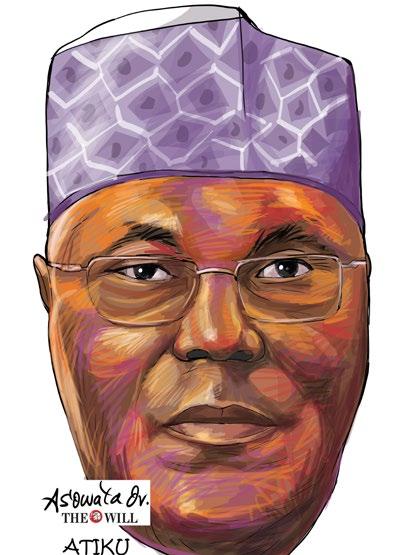
Economy, “because he is doing good work.” He has applauded the performance of Tijani, revealing that the tech minister will retain his portfolio if the coalition succeeds in sending Tinubu back to Lagos come 2027.
Other coalition partners, particularly former Vice President Atiku Abubakar and 2023 Labour Party presidential candidate Peter Obi, are also in talks about the viability of the ADC as a platform for its 2027 presidential ambition. But the final details are still being worked out, according to former National Vice-Chairman, Northwest of the APC, Salihu Lukman, who took time to debunk earlier reports that the party has been adopted as the platform of the coalition.
Meanwhile, the ADC National Chairman, Ralph Nwosu, disclosed to a national newspaper that adoption talks with Atiku, Obi, former Rivers State Governor Rotimi Amaechi, and other political figures, have gone fareaching.
APC has however said that the coalition will fail and Tinubu will be re-elected in 2027. According to the National Secretary of the All Progressives Congress, Ajibola Basiru, “Atiku, Obi, and other coalition leaders are destined to lose the 2027 General Election.”
According to Lukman: “The public should disregard the
Convener of the League, Dr. Umar Ardo alongside former Kano governor, Ibrahim Shekarau and other prominent northern politicians, explained that the group has set up two committees to explore the possibility of forming a new political party or joining an existing one “
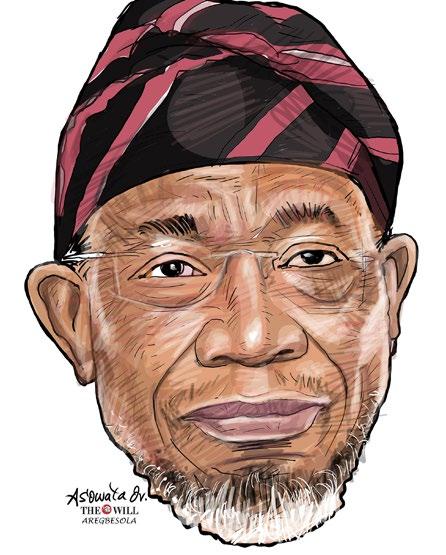
story as it is completely false. No such decision has been taken. Also false is the report that the coalition has adopted the ADC at its meeting on Tuesday, May 20, 2025. The truth is negotiations among all the coalition leaders are progressing very well and final decisions about the political platform for the 2027 election will be taken soon.
Unfortunately, there appears to be some mischief makers promoting and planting stories in the media with the clear aim of sowing seeds of discord among coalition leaders. The public and the media should please disregard all these mischievous stories.”
Yet, the group is waxing stronger by the day. As promised recently, former Minister of Interior and governor of Osun State Ogbeni Rauf Aregbesola who resigned from the APC alongside his group Omoluabi Progressives, welcomed Atiku Abubakar, former Vice President Namadi Sambo to Osun for the coronation of the 49th HRH Owa Obokun Adimula and Paramount Ruler of Ijesaland, Oba Clement Adesuyi Haastrup on Friday.
Aregbesola had addressed his group a few days before his coalition partners would be unveiled at the coronation. Others who warmly received the entourage of the two former Vice Presidents alongside Aregbesola were prominent Osun political figures, including former APC Chairman in Osun State, Lowo Adebiyi; and Chairman of Omoluabi Progressives, Alhaji Azeez Adesiji.
Others included the former Secretary to the State Government, Moshood Adeoti and former Speaker of the House of Assembly, Najeem Salaam.
In addition, that previous day in Abuja, the League of Northern Democrats met to discuss their role in the ongoing coalition talks. Convener of the League, Dr. Umar Ardo alongside former Kano governor, Ibrahim Shekarau and other prominent northern politicians, explained that the group has set up two committees to explore the possibility of forming a new political party or joining an existing one. Ardo disclosed that el-Rufai said SDP is interested in being considered for the fusing, while ADC is waiting on the wings, too.
To resolve the matter, former Cross River State governor, Liyel Imoke would head the Committee charged with looking for a party to join while former Rivers State governor Rotimi Ameachi heads the Committee tasked with registering a new party. Final decisions on all these items would be taken on May 30, 2025, Ardo said.




BY FELIX IFIJEH
Former President, Dr Goodluck Ebele Jonathan, has received the Nigerian Content Lifetime Achievement Award.
Jonathan received the award at the maiden edition of the Champions of Nigerian Content Award ceremony organised by the Nigerian Content Development and Monitoring Board (NCDMB) in partnership with Sweetcrude Ltd.
Held on Wednesday in Yenagoa, the Bayelsa State capital, the award recognised and rewarded individuals and corporate bodies that set the highest standards in deepening local participation in the Nigerian oil and gas industry and contributed significantly to national development.
In his welcome address at the event, the Executive Secretary, NCDMB, Engr. Felix Omatsola Ogbe, noted that the Board had come a long way in the implementation of the NOGICD Act and recorded landmark achievements in which outstanding industry players, individuals and corporate entities deserved to be identified and honoured.
In his words, “The time has come to identify and celebrate pillars of Nigerian Content who shall serve as a shining example of what is expected of others in the industry.”
Speaking after receiving the lifetime achievement award, Jonathan recalled how he promptly signed the Nigerian Content Bill in 2010 when he was the acting President. He stated that an encounter with the Ugandan President, Yoweri Museveni, who had repeatedly mentioned Nigeria as a reference point for underperformance in the utilisation of oil resources, deeply motivated him. Jonathan also pointed out that China’s example of easily domesticating and domiciling oil and gas industry activities further inspired his decision.
He recalled that Senator Lee Maeba, who represented Rivers State South-East Senatorial District in the National Assembly, was among the initiators of the Nigerian Content Bill and deserves special recognition by the NCDMB and Nigerians generally.
The former President appreciated the NCDMB for the success of the Nigerian Content and lauded past and present leadership of the agency that translated the dream behind the Act into reality.
Another top winner in the distinguished individuals category, Engr. Tony Attah, the Managing Director of Renaissance Africa Energy Limited, was named “Nigerian Content Icon of the Year. The award was for his time as the
Managing Director of Nigeria LNG Limited, during which time he secured the Final Investment Decision (FID) for the NLNG Train 7 project and led his organisation to partner with NCDMB to sign the first Service Level Agreement (SLA), which Nigeria LNG signed in June 2017.
Other top winners include Professor Emenike Ejiogu of the University of Nigeria, Nsukka (UNN), as “Nigerian Content Innovator of the Year,” and Ms Iroghama Ogbeifun, Managing Director and Chief Executive Officer of Starzs Investments Company Limited, received the Women in Leadership Award.
In the corporate category, Shell Petroleum Development Company (SPDC), now known as Renaissance Africa Energy Limited, clinched the “Nigerian Content International Upstream Operator of the Year Award,” while Aradel won the “Nigerian Content Independent Upstream Operator of the Year Award.”
Other winners in the corporate category were Nigerian Liquefied Natural Gas (NLNG) Limited as “Nigerian Content
Midstream Operator of the Year”; Dangote Refinery and Petrochemical Company Limited as “Nigerian Content Downstream Operator of the Year”; Dorman Long Engineering Company Limited as “Nigerian Content Indigenous Service Company of the Year”, and Technip FMC as “Nigerian Content International Service Company of the Year.” On the winners list also were Bank of Industry (BOI) as “Nigerian Content Financial Services Provider of the Year” and Thisday Newspapers as “Nigerian Content Media Organisation of the Year.”
Speaking on the selection criteria, a member of the Award Advisory Committee, Mr. Wole Akinyosoye, former Operations Controller with the defunct Department of Petroleum Resources

Managing

(DPR), said measurable metrics were used to determine the winners.
According to him, “Awardees must have demonstrated operational consistency where applicable; must have contributed to enhanced utilisation and monetisation of gas resources as applicable, and must have improved on local refining where applicable in terms of capacity and energy security.” He said, they “must also have strictly complied with the Act and other statutory Nigerian Content requirements, and must have made significant footprint in job creation and local sourcing.”
On the composition of the Advisory Committee for the Award, he pointed out that the pioneer Executive Secretary of the NCDMB, Engr. Ernest Nwapa, was the Chairman, while the Secretary-General of the African Petroleum Producers Association (APPO), Dr. Omar Farouk Ibrahim, and he (Wole Akinyosoye), were members.
The “Champions of Nigerian Content Awards” were held on the sidelines of the Nigerian Oil and Gas Opportunity Fair (NOGOF) 2025.

Felix
Renaissance Africa
and Managing Director, Starzs
Federal

of Petroleum

LWe have informants and collaborators within the Nigerian Armed Forces, within the political class, and within local communities. What we must do is strengthen intelligence gathering and deal with them ruthlessly
“
istening to the Governor of Borno State, Professor Babagana Zulum, speak last Wednesday about politicians, military personnel and members of local communities acting as informants to and collaborators with Boko Haram terrorists was like listening to President Goodluck Jonathan who made exactly the same observations 13 years ago.
Speaking on Breakfast Central, a programme aired on News Central TV on Wednesday, Zulum called for stronger intelligence networks and decisive action against internal saboteurs undermining the country’s security efforts.
“We have informants and collaborators within the Nigerian Armed Forces, within the political class, and within local communities. What we must do is strengthen intelligence gathering and deal with them ruthlessly,” Zulum stated.
He decried what he described as “contractocracy” in Nigeria’s security architecture and urged for a depoliticisation of national security issues, arguing that the insurgency could be ended swiftly if appropriate measures were taken.
“Let’s eliminate contractocracy. In six months, we can put an end to this madness. We must not politicise insecurity,” he lamented. Thirteen years ago, specifically on January 9, 2012, ex-President Jonathan, made a similar accusation.
Speaking a church service in Abuja on Sunday, Jonathan who had declared a state of emergency in the northeast and two other regions of the country on December 31, 2011 as part of the measures to contain a growing insurgency Boko Haram, said, “Some of them (supporters and informants) are in the executive arm of government, some of them are in the parliamentary/legislative arm of government, while some of them are even
in the judiciary, Some are also in the armed forces, the police and other security agencies. Some continue to dip their hands and eat with you and you won’t even know the person who will point a gun at you or plant a bomb behind your house.”
Apart from underscoring the depth of insecurity crisis in Nigeria, the lamentations of the Jonathan and Zulum, in spite of the time lag, show in bold relief the involvement of crucial state actors in sustaining and supporting terrorism, obviously for the benefit of their diabolic plans to feast on the dead and keep Nigeria disunited.
When the Nigeria Bureau of Statistics (NBS) recently published its 2024 Crime Experience and Security Perception Survey, which showed that Nigerians have paid approximately N2.2 trillion to kidnappers as ransom money between May 2023 and April 2024, it was clear that high stakes criminality such as terrorism, kidnapping and banditry has become an active industry well beyond the ambit of gun-wielding AK47 gangsters often shown on TV as bandits and kidnappers.
Sadly, budgetary allocations on insecurity keep growing disproportionately to allocations for social and economic well-being of Nigerians. Between January and June, 2024, for example, the Federal Government disbursed a total of N1.03tn to boost the fight against insecurity and terrorism.
In the budget implementation report for the first half of 2024 as disclosed by Open Treasury, a website that monitors government spending, the amount represents a disbursement rate of 42.80 per cent from its appropriation of N2.41tn and a balance of N1.38tn.
“Despite this spending, no fewer than 5,801 Nigerians were killed in terrorist attacks, and





BY JUDE NDUKWE
By the time this essay is published, candidates from Lagos and Southeast Nigeria scheduled to retake the 2025 Unified Tertiary Matriculation Examination (UTME) would likely have started receiving their result notifications—finally experiencing some relief after enduring what has been described as a traumatic episode orchestrated by a so-called “human error” from JAMB. But the tears shed by Prof. Ishaq Oloyede, the JAMB Registrar, in the aftermath of the outrage, may not be enough to wash away the psychological scars, career setbacks and emotional wreckage left behind.
This shameful incident, which could have denied many otherwise qualified candidates, particularly from the Southeast, access to tertiary education, might have been forgivable if it were a first-time occurrence. Unfortunately, it isn’t. There seems to be a troubling pattern of inexplicable bias against candidates of Southeast origin under Oloyede’s watch.
It appears that Prof. Oloyede is on an ignoble mission to frustrate the educational advancement of Ndigbo—one of their most powerful tools in a system that has often worked overtime to marginalise them. Through subtle and not-so-subtle actions, public institutions like JAMB are increasingly being turned into instruments for executing an anti-Igbo agenda.
Back in May 2017, I raised a red flag in my article, “Exam Malpractice and JAMB’s Futile Attempt to Tarnish Igbo Image”, after Oloyede alleged that over 10,000 UTME candidates in Anambra State were caught cheating. He went further to claim they had all been handed over to security agencies—a claim that JAMB curiously walked back just 24 hours later.
Let’s revisit parts of that piece: “Like a well-rehearsed script, no sooner had the exams ended than JAMB came up with a wild and ludicrous claim that more than 10,000 candidates were caught in exam malpractices in Anambra State, one of Nigeria’s foremost centres of academic excellence.
Unfortunately, while the Anambra announcement was hastily released in a bid to crucify Igbo candidates and deny them university admissions, JAMB reversed itself the next day—saying it would now review CCTV footage to identify culprits. If JAMB needed to examine CCTV footage before making accusations, why didn’t it wait? Was CCTV only necessary for Anambra centres?
Even more baffling was the claim that while 10,000 candidates were allegedly caught cheating, the exams in Anambra were ‘successful’

and without disruption. How could such mass arrests not disrupt anything?” Till today, that controversy was quietly swept under the carpet. No explanations. No accountability. No consequences. This lack of responsibility only emboldens actors like Oloyede to continue these questionable acts against Southeast candidates.
The recent excuse of a “technical glitch” or “human error” is hard to swallow, especially given the registrar’s track record. The 2025 UTME debacle has been dismissed as a mistake, yet its effects have been devastating, pushing some students to the brink of mental breakdown. If not for growing outrage and threats of legal action, would JAMB have ever considered a review?
Even Lagos, which was lumped into the re-examination, appears to be collateral damage in what many believe is a targeted campaign. Ironically, a significant portion of the affected Lagos candidates are likely of Southeast origin.
If Oloyede were guided by sincerity and fairness, his team would have immediately flagged the unusually high failure rate in a region known for academic excellence and initiated an internal review. Instead, they deflected, arrogantly claiming the outcomes were consistent with “recent trends.” Now, Nigerians finally understand what JAMB meant by “recent trends.” And if this trend— deliberately or otherwise—continues, then we must ask whether JAMB is still serving the national interest or a narrow, prejudiced one.
EVEN MORE BAFFLING WAS THE CLAIM THAT WHILE 10,000 CANDIDATES WERE ALLEGEDLY CAUGHT CHEATING, THE EXAMS IN ANAMBRA WERE ‘SUCCESSFUL’ AND WITHOUT DISRUPTION. HOW COULD SUCH MASS ARRESTS NOT DISRUPT ANYTHING?
Public institutions must rise above bias. JAMB should not become a tool for systemic oppression, especially against a resilient and historically marginalized group like the Igbo. The future of our youth is far too important to be sacrificed on the altar of ethnic or religious prejudice. It’s high time Oloyede and JAMB buried any such narrow agendas. They must stop being so incompetent, so inconsiderate, so unresponsive, and so irresponsible. The future of our nation—embodied in the dreams of these young candidates—must never be destroyed in the service of parochial interests.
No amount of tears—crocodile or otherwise—can cleanse the injustice or undo the damage inflicted on the nation’s youth.
•Jude Ndukwe sent this piece from Abuja
The recent announcement that President Bola Ahmed Tinubu has approved N10 billion for a solar power grid project in the Aso Rock Presidential Villa has provoked widespread outrage — and rightly so. The move, confirmed by Mustapha Abdullahi, Director-General of the Energy Commission of Nigeria, is said to be aimed at cutting down the Villa’s unsustainable N47 billion annual electricity bill.
However, the optics of this decision are troubling. While the President and his inner circle will now enjoy uninterrupted power supply, millions of Nigerians continue to wallow in total darkness, battling epileptic power, outrageous tariffs and an unreliable electricity grid.
Rather than fix the nation’s decaying power infrastructure, President Tinubu appears more interested in insulating himself from the same challenges that torment ordinary citizens. His justification — that the project aligns with an agenda to diversify energy sources — rings hollow, especially when no detailed plan has been shared on how he intends to extend such innovations to the rest of the country.
This decision has further deepened what can best be described as energy apartheid: a two-tier system where a privileged few enjoy constant, clean energy, while the majority are left with darkness, inflated bills and broken promises.
Recall Tinubu’s bold 2023 campaign statement:
“If I don’t give you constant electricity in four years, don’t vote for me again in 2027.”
Now, less than two years in, not only is Nigeria still trapped in darkness, the President appears to have turned that promise into a personal privilege— ensuring light for himself, while the nation remains in blackout.
The solar grid project, therefore, smacks of entitlement
and self-aggrandizement, rather than visionary leadership. It’s a cruel irony that the man who once campaigned on fixing the national grid now seeks refuge from it—leaving the people he swore to serve at the mercy of a dysfunctional power sector plagued by gas shortages, dilapidated infrastructure and distribution fraud.
For context, Nigeria’s power sector has undergone significant changes over the years. Since the privatisation of NEPA, the government retained full ownership of the Transmission Company of Nigeria (TCN), responsible for managing the country’s 132kV and 330kV transmission system. It also retains stakes in six Generation Companies (Gencos) and 11 Distribution Companies (Discos), though these stakes vary.
Take the Benin Electricity Distribution Company (BEDC), for instance: the Federal Government owns 40 percent of it, with four states—Delta, Edo, Ekiti, and Ondo—owning 34.2 percent of that 40 percent. That translates to a 13.68 percent collective stake for the states and roughly 13 percent for the Federal Government. Yet, despite this involvement, the government has failed to hold operators accountable or improve service delivery.
THIS N10BN SOLAR GRID, AS FAR AS NIGERIANS ARE CONCERNED, IS A SLAP IN THE FACE. IT HIGHLIGHTS THE GROWING DISCONNECT BETWEEN THE RULING ELITE AND THE MASSES. IT EXPOSES A LEADERSHIP STYLE THAT APPEARS MORE INVESTED IN OPTICS THAN IN RESULTS
Instead of leveraging these existing structures to provide affordable, stable electricity nationwide, Tinubu has chosen to prioritise comfort for Aso Rock — spending billions to ensure a luxurious escape from the very hardship his administration was elected to address.
This N10bn solar grid, as far as Nigerians are concerned, is a slap in the face. It highlights the growing disconnect between the ruling elite and the masses. It exposes a leadership style that appears more invested in optics than in results.
Unless the President redirects his focus to solving the power crisis holistically, rather than shielding himself from it, he risks cementing a legacy of missed opportunities and broken promises. There’s still time for course correction, but the clock is ticking toward 2027.
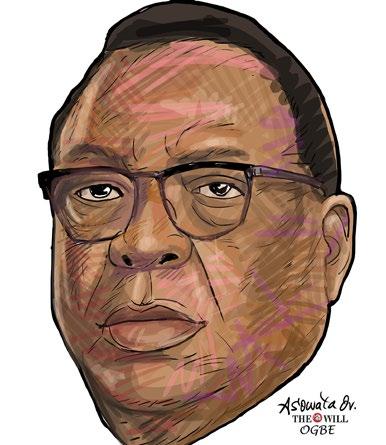
Former President, Dr. Goodluck Ebele Jonathan has received the Nigerian Content Lifetime Achievement Award at the maiden edition of the inaugural Champions of Nigerian Content Award ceremony organized by the Nigerian Content Development and Monitoring Board (NCDMB) in partnership with Sweetcrude Ltd on Wednesday in Yenagoa, Bayelsa State.
The award recognized and rewarded individuals and corporate bodies that set the highest standards in deepening local participation in the Nigerian oil and gas industry and contributed significantly to national development.
In his welcome address at the event, the Executive Secretary, NCDMB, Engr. Felix Omatsola Ogbe noted that the Board had come a long way in implementation of the NOGICD Act and recorded landmark achievements in which outstanding industry players, individuals and corporate entities, deserved to be identified and honoured.
In his words, “the time has come to identify and celebrate pillars of Nigerian Content who shall serve as a shining example of what is expected of others in the industry.”
Speaking after receiving the lifetime achievement awards, Dr. Jonathan recalled how he promptly signed the Nigerian Content Bill in 2010 when he was acting President in 2010, stating that an encounter with Ugandan President Yoweri Museveni, who repeatedly mentioned Nigeria as a reference point for underperformance in utilisation of oil resources. He pointed that the example of China that easily domesticated and domiciled oil and gas industry activities greatly motivated him.
EDITOR Sam Diala
Fidelity Bank was the toast of equity investors during the week as the stock drove NGX early rally on Friday. This was sparked by the massive hunt for bank stocks as investors hustle to take positions in the current recapitalisation exercise.
Fidelity’s rally during the week points to a sharp rise after a spate of negative performance that has now been substantially corrected. This culminated in stock picking a place in the club of topmost three equities that determined the performance of the market for the third trading week of May.
Fidelity Bank closed its last trading day (Friday, May 23, 2025) at N18.65 per share on the Nigerian Exchange (NGX), recording a 7.5 percent gain over its previous closing price of N17.35. Fidelity began the year with a share price of N17.50 and has since gained 6.57 percent on that price valuation.
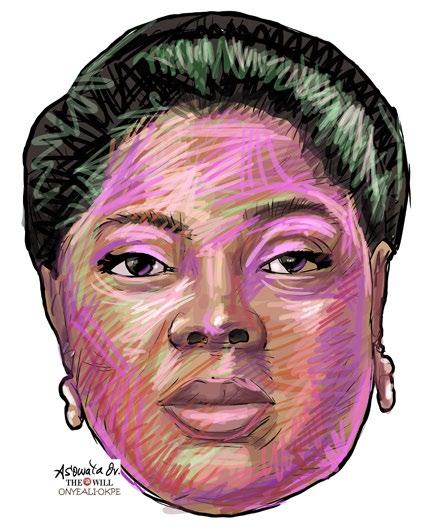
“Fidelity is strong; the bank’s recent performance points in that direction. It was the first to embark on the recapitalisation outing while the others were yet to commence. Its shares were oversubscribed and its successful acquisition of the Union Bank UK subsidiary positions it for a greater deal”, said Adewale Braimoh, a financial analyst.
Data from the NGX showed that Fidelity Bank is the second most traded stock on the Nigerian bourse over the past three months (Feb 19 - May 23, 2025).
The stock has traded a total volume of 2.75 billion shares—in 34,194 deals—valued at N52.1 billion over the period, with an average of 43.6 million traded shares per session.
A volume high of 389 million was achieved on April 23rd, and a low of 6.23 million on February 24th, for the same period.
Trading in the top three equities including Fidelity Bank Plc (measured by volume) accounted for 1.610 billion shares worth N8.897 billion in 8,079 deals, contributing 40.95 percent and 11.89 percent to the total equity turnover volume and value respectively.
A total turnover of 3.932 billion shares worth N74.813 billion in 105,220 deals was traded last week by investors on the floor of the Exchange, in contrast to a total of 2.606 billion shares valued at N63.785 billion that exchanged hands in the previous week in 77,593 deals.
premium accounts which recorded an increase of 133.58 percent to N305.55 billion.
This stellar performance suggests that Fidelity is making significant advancement toward meeting the Central Bank of Nigeria (CBN) new capital requirement of N500 billion for banks with international licence. of 100 percent equity in Union Bank UK, a subsidiary of Union Bank Plc, in September 2023.
It explained that the acquisition aimed at strengthening its strategic initiatives on international expansion as it planned to expand into five African countries via acquisition.
The stellar performance deepens the Capital Adequacy Ratio by 23.5 percent - a positive result from the year result.
The bank completed the first phase of its capital raising exercise
He mentioned that Senator Lee Maeba who represented Rivers State South East Senatorial District in the National Assembly, was among the initiators of the Nigerian Content Bill and deserves special recognition by the NCDMB and Nigerians generally. The former President appreciated the NCDMB for the success of the Nigerian Content and lauded past and present leadership of the agency that translated the dream behind the Act into reality.
Continues on page 35
Fidelity thus played a role in the Financial Services performance (measured by volume) which led the activity chart with 2.405 billion shares valued at N32.271 billion traded in 44,570 deals; thus contributing 61.16 percent and 43.14 percent to the total equity turnover volume and value respectively.
Fidelity Bank closed its last trading day (Friday, May 23, 2025) at N18.65 per share on the Nigerian Exchange (NGX), recording a 7.5 percent gain over its previous closing price of N17.35




Continues from page 34
monies arising from potential oversubscription subject to the Company’s issued share capital.
The 2024 CAR of 23.5 percent points to the bank’s determination to remain in the industry leader cycle in the post-recapitalisation environment that would redefine the financial services space as technology dominates operations.
Fidelity’s financial ratios improved with rising profitability ratios, stronger cost efficiency, and higher asset utilisation.
Analysis of the 2024 audited financial statement showed that return on equity and assets increased to 41.70 percent and 3.15 percent, respectively.
Similarly, net profit margin and net interest margin increased to 26.65 percent and 12.00 percent, respectively.
The cost-to-income ratio and cost of risk declined to 42.90 percent and 1.50 percent respectively.
“Fidelity was the first to go to the capital market for the recapitalisation scheme among the other deposit money banks. Its performance trajectory affirms its industry leadership. Shareholders’ equity is stronger than ever in the history of the bank; the post-recapitalisation era would push Fidelity to global spotlight,” said Andy Ekwerugo, an investment banker.
Key takeaways from its 2024 financial statement include the fact that Fidelity has sufficient capacity to absorb loan delinquency.
This is an essential characteristic during a capital raise, as it builds investor confidence in the banking group’s ability to weather economic or operational shocks. The loan default allowance ratio of over 100 percent (precisely 149 percent) attests to this fact.
Fidelity’s earning growth rate of 51.7 percent, over an annualized average of five years’ data against industry’s earnings growth rate of 30.4 percent, puts it on a comfortable operating zone as competition intensifies after the recapitalisation.
Furthermore, the five-year average earnings per share (EPS) growth rate of 49.3 percent, primarily driven by rapid growth in top-line earnings, will make the stock investors’ delight.
With a dividend yield of 11 percent and a payout ratio of 24 percent, the shareholders’ funds surge in 2024 gives a fresh insight into the robust stability of the lender.
Fidelity Bank Plc recorded a pre-tax profit of N385.215 billion for the 2024 financial year that ended December 31, marking an impressive 210.01 percent year-on-year (YoY) growth. Despite a windfall tax of N13.33 billion, posttax profit surged by 179.63 percent to N278.106 billion.
The audited financial statement showed that gross earnings grew by 87.72 percent to N1.043 trillion, with core operational income contributing about 97 percent of total revenue.
Fidelity Bank Plc recorded a pre-tax profit of N385.215 billion for the 2024 financial year that ended December 31, marking an impressive 210.01 percent year-on-year (YoY) growth.
Despite a windfall tax of N13.33 billion, post-tax profit surged by 179.63 percent to N278.106 billion.
The audited financial statement showed that gross earnings grew by 87.72 percent to N1.043 trillion, with core operational income contributing about 97 percent of total revenue.
The Dangote Group has unveiled a multibillion naira agricultural partnership with the Niger State Government to boost rice production and strengthen Nigeria’s food security.
The Senior Special Adviser to the President of Dangote Group, Fatima Abdurrahman, announced the partnership during the opening of the 2025 Niger National Trade Fair in Minna.
She disclosed that the conglomerate is investing heavily in a 32 metric tonnes per hour rice mill project located in Wushishi, which sits on a 30-hectare site, noting that the mill is “progressing steadily and on track for completion.”
According to her, the project forms part of the Niger Food Initiative, an agricultural development programme launched by the state government in collaboration with the private sector.
“As part of our commitment to advancing agriculture, we plan to establish one of the largest rice mills here in Niger State,” the Dangote official said.
Abdurrahman explained that the high-capacity mill would significantly boost rice production and storage in the state, describing it as “a cutting-edge facility that incorporates the latest innovations in rice milling technology.”
“This state-of-the-art facility ensures high efficiency, minimal waste, and premium-quality output,” she added. “Once operational, it will not only boost local rice production but also strengthen the entire agricultural value chain, from farm to market.”
Further, Abdurrahman noted that the mill would be supported by 32 silos, each with a capacity of 2,500 metric tonnes of paddy rice, and would include a captive power generation facility producing 5.8
Another top winner in the distinguished individuals category was Engr. Tony Attah, Managing Director of Renaissance Africa Energy Limited, as “Nigerian Content Icon of the Year. The award was for his time as the Managing Director of Nigeria LNG Limited, during which time he secured the Final Investment Decision (FID) for NLNG Train 7 project and led his organization to partner with NCDMB to sign the first Service Level Agreement (SLA) with Nigeria LNG in June 2017.
Other top winners include Professor Emenike Ejiogu of the University of Nigeria, Nsukka, (UNN), as “Nigerian Content Innovator of the Year,” and Ms. Iroghama Ogbeifun, Managing Director and Chief Executive Officer of Starzs Investments Company Limited received the women in leadership award.
In the corporate category, Shell Petroleum Development Company (SPDC), now known as Renaissance Africa Energy Limited, clinched the “Nigerian Content
International Upstream Operator of the Year Award,” while Aradel won the “Nigerian Content Independent Upstream Operator of the Year Award.”
Other winners in the corporate category were Nigerian Liquefied Natural Gas (NLNG) Limited as “Nigerian Content Midstream Operator of the Year”; Dangote Refinery and Petrochemical Company Limited as “Nigerian Content Downstream Operator of the Year”; Dorman Long Engineering Company Limited as “Nigerian Content Indigenous Service Company of the Year,”and Technip FMC as “Nigerian Content International Service Company of the Year.”
On the winners list also were Bank of Industry (BOI) as “Nigerian Content Financial Services Provider of the Year” and Thisday Newspapers as “Nigerian Content Media Organisation of the Year.”
Speaking on the selection criteria, a member of the Award Advisory Committee, Mr. Wole Akinyosoye,

megawatts of electricity.
“The project aligns with broader efforts to reduce reliance on the national grid,” she noted.
Abdurrahman added that the Dangote Group would also act as 100 per cent off-takers of rice produced by local out-growers, sourcing inputs like fertilisers and seedlings for farmers, asserting that the project will “generate significant employment opportunities and contribute to the agricultural development of Nigeria.”
Speaking on behalf of Governor Muhammed Bago, the Commissioner for Trade, Investment and Industry, Aminu Takuma, said Niger State is open for massive investment in agriculture. He commended the Dangote Group and urged it to take advantage of the state’s investor-friendly environment.
Takuma also disclosed that the state government is working to upgrade the Niger Trade Fair to an international event.
President of the Niger Chamber of Commerce, Industry, Mines and Agriculture, Dr Bisi Adeniyi, called on private sector players to invest in the state’s vast agricultural potential.
On his part, the Minister of State for Agriculture and Food Security, Sabi Abdullahi, who was represented by Dr Suleiman Ladan, said commercial agriculture remains central to President Bola Tinubu’s economic development agenda.
To boost food security, the Aliko Dangote Foundation (ADF) had in March 2025, extended its Food Intervention Programme to Kwara State with 25,000 bags of 10kg rice set to be distributed across 16 local government areas in three days.


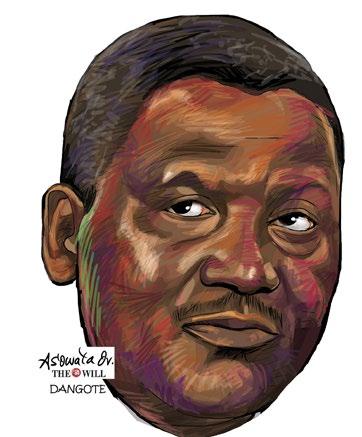
The ADF team led by the Group General Manager Human Resources, Dangote Cement PLC, Ahmed Gobir, was received by the Kwara State governor, Abdulrazaq Abdulrahman, represented by his deputy, Kayode Alabi, at the Ministry of Agriculture, Ilorin, the Kwara State capital on March 25, 2025.
Mr Alabi expressed that the unwavering commitment of the Chairman of the Aliko Dangote Foundation, Mr Aliko Dangote, in alleviating the suffering of the vulnerable is a great inspiration and one that is worth emulation.
“I would like to take this opportunity to commend the Aliko Dangote Foundation for this kind and selfless contribution. This gesture not only
complements the ongoing efforts of the Kwara State Government to support vulnerable communities, but it also demonstrates the power of partnership between the public and private sectors in lifting our people out of hardship.
“We remain deeply grateful for the Dangote Foundation’s continued support for indigent people across the country. This generosity serves as a reminder of the importance of corporate social responsibility and the critical role philanthropists play in addressing poverty and hardship.
“I encourage other individuals and corporations to follow in the footsteps of the Dangote Foundation and similar bodies, as we work together to build a better, more inclusive society for all,” he said.
Malam Gobir, who represented the Chairman of the Aliko Foundation, stated that the ADF decided to partner with state government in the 2025 food intervention programme distribution to foster relationship between the private and public stakeholders, noting that out of the one million bags of rice for the 774 local government areas of the federation, Kwara State has received 25,000 bags for its 16 local governments which is aimed at cushioning the effect of economic hardship.
“The ADF is the philanthropic effort of Mr Aliko Dangote and has been consistent in delivering different humanitarian projects across the federation.
“This is the second year in a row that the ADF is donating one million bags of 10kg rice worth N16bn for the 36 states and the FCT.
“This is not just a gesture of charity; it is a demonstration of our commitment to set Nigerians and Africans up for success, it is a testament to further foster the Aliko Dangote Foundation’s four-

BY KINGSLEY AYOZIE
Change is constant, and reforms, whether in taxation, fiscal policy, monetary systems, banking, agriculture, healthcare, education or information and communication technology, are necessary steps in every nation’s development journey. What remains critical is our collective ability to assess such reforms with objectivity and a positive mindset. In this context, the focus of this article is to examine Nigeria’s tax reform system through the lens of students and practitioners, highlighting the possible gains and the inevitable challenges that accompany such transformational shifts.
The history of tax reform in Nigeria can be traced back to two broad phases: the preindependence era and the post-independence era. Before 1960, local institutions played a central role in collecting levies and other forms of revenue on behalf of governing authorities.
The colonial administration made efforts to formalise the process, enacting laws, such as the Native Revenue Ordinance of 1917 and the Direct Taxation Ordinance of 1940. These early reforms laid the groundwork for a more structured taxation system.
From independence in 1960 to the present day, a series of reforms have shaped Nigeria’s tax landscape. The Tax Reform of 1978 restructured income taxation and introduced withholding tax, creating a more reliable mechanism for revenue collection.
The 1993 reform coincided with the introduction of Value Added Tax (VAT), which replaced the repealed Sales Tax Act of 1986. In 2012, the National Tax Policy aimed to establish a coherent administrative structure for tax governance, while the 2017 policy review focused on promoting voluntary compliance, expanding the tax base and addressing revenue leakages.
A more recent and robust effort came with the Finance Act of 2020, which increased VAT from 5 percent to 7.5 percent and introduced tax reliefs and incentives for small businesses. Most notably, the Presidential Fiscal Policy and Tax Reform Committee, established in 2023, sought to overhaul the nation’s fiscal system.
The committee’s objectives included harmonising multiple levies, streamlining tax collection mechanisms, and creating a unified revenue framework. These efforts culminated in the draughting of four significant bills: the Nigerian Tax Bill, the Nigerian Tax Administration Bill, the Nigerian Revenue Service Establishment Bill, and the Joint Revenue Board Establishment Bill.
Tax reform, at its core, refers to the comprehensive restructuring of how taxes are levied, collected and managed. Its objectives include improving administrative

efficiency, broadening the revenue base without overburdening taxpayers, modernising outdated laws, enhancing the ease of doing business, ensuring economic and social welfare, simplifying compliance and aligning the system with global standards.
For reforms to be effective, certain strategies must be adopted—improving tax administration, adjusting tax rates prudently, enacting taxpayer-friendly laws, and widening the tax net.
For both students and practitioners, tax reforms offer immense opportunities.
First, increased government revenue can directly support the salaries and operational capacity of public institutions where many professionals work. Second, job creation is a foreseeable outcome, as more efficient tax structures require skilled administrators and analysts, thereby absorbing more students and professionals into the workforce. Reforms also tend to encourage a favourable investment climate, stimulating foreign direct investment, which, in turn, drives economic growth beneficial to both demographics.
Furthermore, tax reforms stimulate research and development. Students and academics can explore new areas of inquiry, while practitioners are compelled to upgrade their knowledge and skills to align with evolving tax regimes. This dynamic environment enhances professional development across the board.
A case in point is the 2023 Tax Reform, which included provisions to boost the student loan scheme. Under this reform, the Tertiary Education Trust Fund (TETFund) is required to allocate 30 percent of its revenue to the Nigerian Education Loan Fund (NELFUND),

For reforms to be effective, certain strategies must be adopted—improving tax administration, adjusting tax rates prudently, enacting taxpayer-friendly laws, and widening the tax net
which was established through the Student Loans Act signed into law by President Bola Ahmed Tinubu on June 12, 2023. NELFUND serves as the official agency overseeing student loans in Nigeria and is a direct beneficiary of this reform initiative.
Beyond these individual benefits, tax reform contributes to national fiscal stability, drives sustainable economic development and ensures that wealth is more equitably distributed across the population. However, like all major policy shifts, tax reforms come with their own set of challenges.

One such challenge is the potential rise in tax rates, which can reduce the disposable income of students and professionals alike. Resistance to change is another issue—many may be reluctant to adapt to new systems due to a lack of understanding or perceived complexity.
The scarcity of qualified personnel to drive these reforms effectively is also a concern, as is the limited public awareness about the reforms themselves. If practitioners and students are not adequately informed or trained, they may struggle to engage with the new system meaningfully.
Moreover, communication gaps and a general reluctance to learn new protocols can impede the adoption of the reforms. Finally, the legal and administrative complexities that often accompany tax reforms may discourage full implementation or create uncertainties that affect compliance.
Despite these hurdles, the value of tax reform cannot be overstated. For Nigeria’s students and practitioners, it represents both a challenge and an opportunity—a call to action for a more engaged, informed, and forwardlooking citizenry. With proper education, awareness, and institutional support, the potential benefits can far outweigh the difficulties.
• Ayozie is a Chartered Accountant and Public Affairs Analyst

BY SUBAIR NURUDEEN ADEWALE
In an era where seconds can cost millions, banks can no longer afford to treat downtime as a minor inconvenience. The digital age has rewritten the rules and cloud computing is now the baseline, not the bonus.
The global banking system is under pressure like never before. Surging customer expectations, stricter regulations and nimble fintech challengers are reshaping the landscape. Yet many traditional banks are still anchored to legacy systems designed for a slower, less connected world.
The result? Outages, lost transactions, regulatory headaches and reputational damage that spreads instantly across social media. In 2024 alone, financial institutions worldwide lost an estimated $350,000 for every hour of IT downtime. In an industry where trust is currency, that’s not just expensive; it’s dangerous.
Cloud computing changes the game entirely. By distributing systems and workloads across multiple data centres and geographies, banks can dramatically reduce their exposure to outages and respond in real-time to disruptions. An average uptime of 99.99 percent, compared to 97 percent for traditional systems is more than a technical statistic. It’s peace of mind for customers and a competitive edge for the bank.

Historically, recovering from a system failure could take days. Backups had to be restored, data reconciled and operations rebooted. For a sector that thrives on speed and certainty, that’s an unacceptable lag.
Cloud-based disaster recovery has flipped that equation. Modern solutions replicate live systems across regions, enabling near-instant failover when things go wrong. In the past year, banks using these tools cut recovery times by more than half, staying ahead of both regulators and crises from cyberattacks to natural disasters.
Agility isn’t just a tech buzzword; it’s the new gold standard in financial services. Customer behaviour is shifting by the month. Regulations evolve. Disruptors emerge. Banks need to respond, not over quarters, but over days.
Cloud infrastructure makes this possible. It allows banks to test, build, and deploy new services at pace, from mobile apps to

AI-powered risk tools. According to IDC, 65 percent of banks say at least half their recent innovations were made possible by cloud adoption.
Moreover, cloud-native systems allow for “always-on” development. Updates roll out in increments, reducing risk and avoiding the dreaded maintenance window that customers love to hate.
Traditional IT models are capital-intensive and bloated with hardware costs, physical security, and maintenance overhead. Cloud flips the script. It shifts spending to a pay-as-you-go model that scales with demand.
In 2024, banks using cloud systems cut IT costs by up to 30 percent, freeing up capital for real innovation. At the same time, automation in cloud environments has lifted productivity, with Forrester reporting a 25 percent boost across financial institutions.
Not long ago, security was the cloud’s Achilles’ heel or at least perceived as such. But the tide has turned. Today’s top-tier cloud providers are often more secure than in-house data centres, offering round-the-clock monitoring, zerotrust architecture, and compliance with global standards from ISO to PCI DSS.
Today’s top-tier cloud providers are often more secure than in-house data centres, offering roundthe-clock monitoring, zero-trust architecture, and compliance with global standards from ISO to PCI DSS
In 2025, 82 percent of banks surveyed rated the cloud as secure or more secure than legacy systems. With end-to-end encryption, identity management, and automated audit trails, the argument has moved from “Is it safe?” to “Can we afford not to switch?”
Banking traffic is anything but predictable. A Black Friday surge, a central bank announcement, or even a viral tweet can send transaction volumes soaring.
Legacy systems buckle under such pressure. Cloud platforms thrive. In 2024, some banks using cloud infrastructure handled five times their normal load during peak periods with no slowdown, no crashes, and no drama.
More than capacity, the cloud supports collaboration — enabling seamless integration with fintechs, regtechs, and partners in the open banking ecosystem. It makes financial services modular, dynamic, and crucially futureready.
The shift to the cloud is not about joining a trend. It’s about survival. Banks that cling to outdated systems will find themselves boxed in by cost, delay, and vulnerability. Those that embrace the cloud stand to gain not just resilience, but relevance.
The banking revolution is already underway. What remains is whether institutions want to lead it or be left behind by it.
The cloud isn’t coming. It’s here. And for banks that want to stay in business and stay trusted, it’s time to move up.
•Subair is a Cloud Engineer and IT support Engineer
Photo Editor: Peace Udugba [08033050729]
FLEX, the newest entrant redefining digital payments in Africa, officially unveiled its brand and platform built on one powerful premise: freedom to move money without friction.
Unveiled during a private launch event held at the Wheatbaker Hotel in Ikoyi, Lagos on May 19, 2025, FLEX is a modern mobile payment platform that makes sending, receiving, and spending money effortless. With a personal PayTag™ or QR code, users can transfer funds, pay vendors, or split costs in seconds — no account numbers, no hidden fees, no delays.
Designed for everyday use, FLEX offers instant notifications, secure onboarding and a clean, intuitive interface.
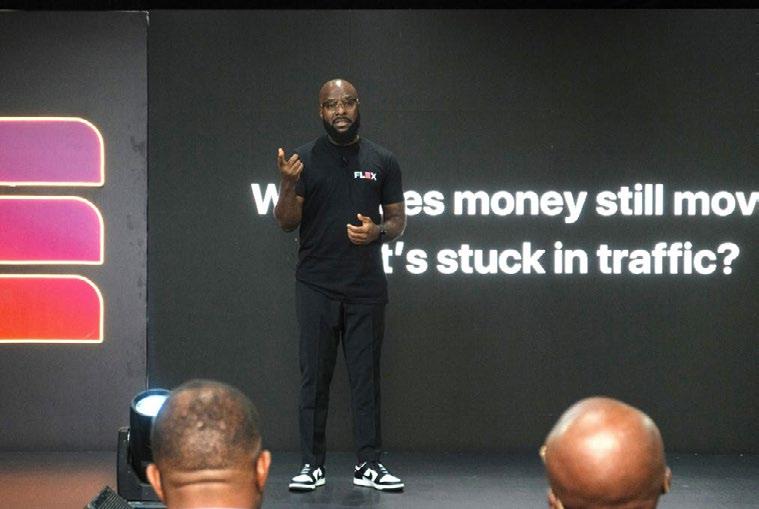
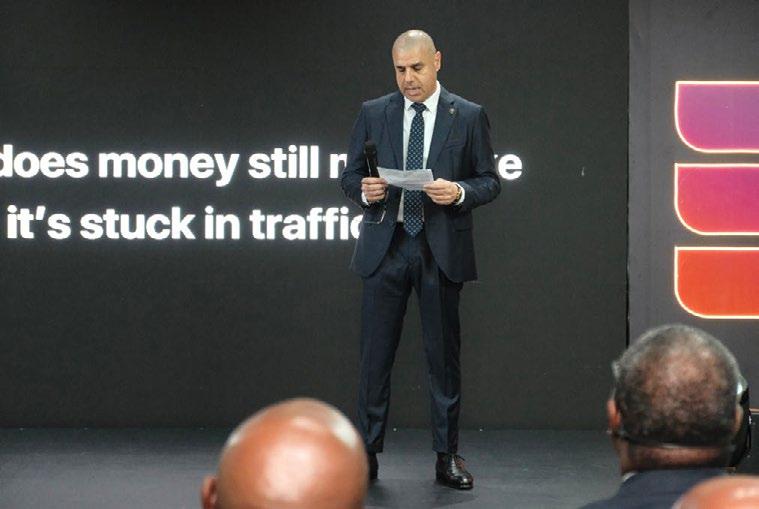
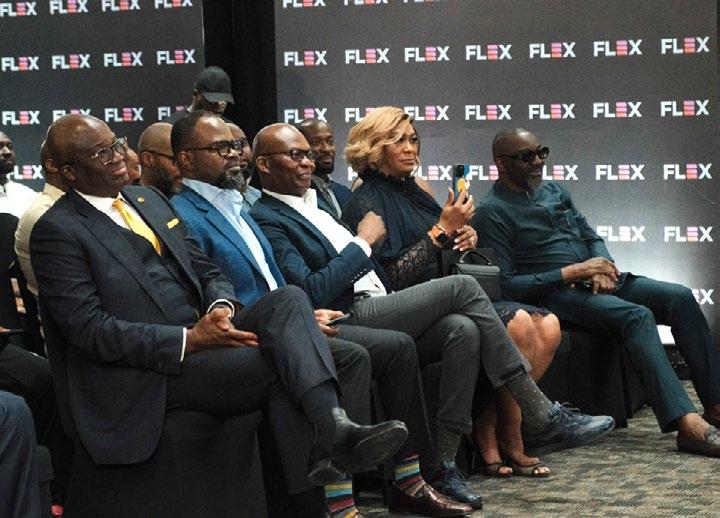
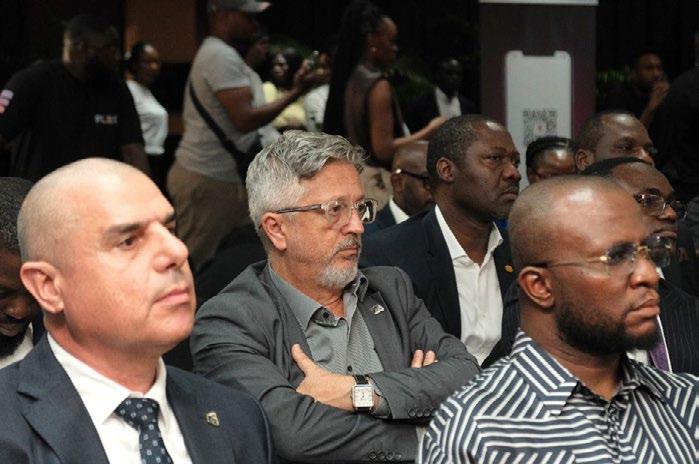


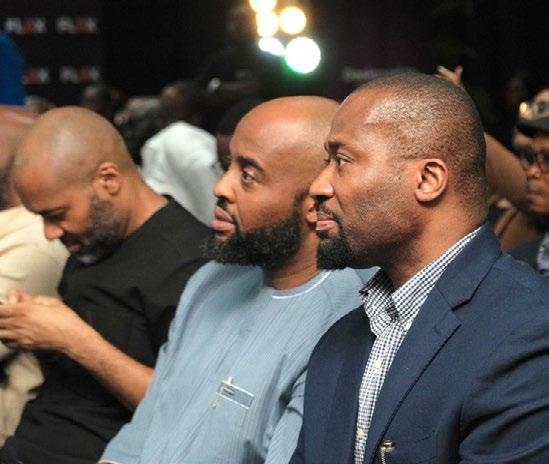








BY JUDE OBAFEMI
Favour Ofili made history on Saturday, May 17, at the Adidas Atlanta City Games, breaking the women’s 150m world record with a time of 15.85 seconds.
The 22-year-old Nigerian sprinter became the first woman to run under 16 seconds in the event, surpassing Bahamian athlete Shaunae Miller-Uibo’s previous record of 16.23 seconds set in 2018.
The achievement came nearly a year after Ofili faced one of the most disappointing moments of her career. Despite qualifying for the 100m at the Paris 2024 Olympics with a time of 11.06 seconds at the Nigerian national trials, administrative errors by the Athletics Federation of Nigeria and the Nigerian Olympic Committee prevented her from competing in the event.
The defining race took place at Atlanta’s Piedmont Park under favourable conditions. Wind speed registered at 2.0 metres per second, within legal limits for record recognition. Ofili finished well ahead of her closest competitor, American sprinter Tamari Davis, who recorded 16.14 seconds.
The performance established a new benchmark in the 150m, an event contested less frequently than the
The triumph in Atlanta contrasts sharply with the disappointment Ofili endured at the Paris Olympics

standard 100m or 200m distances but still significant in track and field.
After her record-breaking run, Ofili reflected on her approach to the race. “Honestly, it is all God. I am surprised by the time, yes, but I know I put in the work. I trust my coach, I trust his programme, and I knew that at the right time, the Lord would make it happen,” she said. Her coach had advised her to treat the 150m like a “long 100m,” encouraging her to relax and sprint. This strategy, combined with her natural speed and focus, enabled her to achieve a time that places her among athletics history’s elite performers.
The triumph in Atlanta contrasts sharply with the disappointment Ofili endured at the Paris Olympics. Having worked for four years to earn her opportunity, she learned on the eve of the Games that her entry for the 100m had not been submitted. She took to social media to voice her frustration, writing: “It is with great regret that I have just been told I will not be competing in the 100 meters at this Olympic Games. I qualified, but those with the AFN and NOC failed to enter me. I have worked for 4 years to earn this opportunity. For what?”
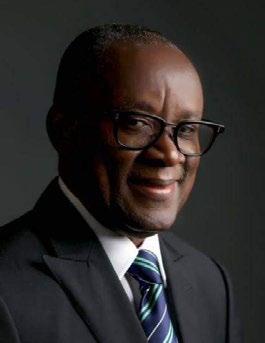

The exclusion prompted an investigation by Nigeria’s then-Sports Minister, Senator John Owan Enoh. The investigative panel found two AFN officials responsible for the oversight. Secretary General Rita Mosindi was found negligent in her duties, relying solely on WhatsApp messaging for official communication regarding Ofili’s registration. Technical Director Samuel Onikeku was criticised for not acting on information about Ofili’s omission from the 100m event. The panel recommended disciplinary measures against both officials and proposed compensation of N8 million (approximately $5,000) for Ofili to address the disappointment and distress caused by the error.
This was not the first time Nigerian sports governance had impacted Ofili’s career. She had previously missed the Tokyo 2020 Olympics due to the country’s failure to comply with anti-
doping testing requirements. The AFN failed to release funds for mandatory medical tests, preventing Ofili and 13 other Nigerian athletes from competing. This pattern reveals ongoing systemic issues within Nigerian athletics administration.
The timing of Ofili’s Olympic exclusion was particularly frustrating given the competitive landscape of the Paris 2024 women’s 100m event. Jamaican sprinter Shericka Jackson, a leading contender, withdrew from the race due to injury, leaving the field more open than anticipated. With a personal best of 10.93 seconds in the 100m, Ofili possessed the speed to potentially contend for a medal. Her absence represented a missed opportunity not only for her personally but also for Nigeria, which concluded the Games without winning a single medal.
Despite the setback, Ofili did compete in Paris, participating in the 200m event where she reached the final and finished sixth. She also competed in the 4x100m relay, contributing to Nigeria’s overall efforts though the team did not medal. Her sixth-place finish in the 200m final marked a solid result under the circumstances and showed her ability to perform on the biggest stage even after her predicament in the 100m.
Ofili’s experience reflects broader problems within Nigerian athletics. Administrative lapses and insufficient support have repeatedly hindered athletes despite the country’s wealth of athletic talent. The investigation into her Olympic exclusion highlighted these ongoing challenges and called for reforms to prevent similar incidents. Historical examples, including the antidoping compliance issues at Tokyo 2020, underline the consistency of these difficulties.
The consequences of such governance failures extend beyond individual athletes. Nigeria’s eighth Olympic appearance without a medal at Paris 2024 is evidence of how administrative shortcomings can limit a nation’s sporting success. Athletes bear the consequences of institutional failures, often seeing years of preparation and dedication wasted due to preventable errors.
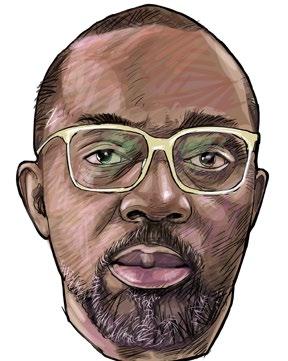
On the night of May 20, a torrential downpour in Ilesha, Osun State, did more than flood the streets, it tore down a section of the perimeter wall at the Medium Security Custodial Centre, enabling seven inmates to seize the moment and escape. This audacious jailbreak, described as opportunistic by the Nigerian Correctional Service (NCoS), has cast a harsh spotlight on the dilapidated state of Nigeria’s prison system. As authorities scramble to recapture the fugitives, offering a N5 million reward for credible information, the incident has sparked renewed debate about systemic failures in the nation’s correctional facilities, from crumbling infrastructure to overcrowding and inhumane conditions. The Ilesha escape is not just a local crisis but a symptom of a broader, deeply entrenched problem that threatens public safety and justice across Nigeria.
The breach occurred around 2:00 a.m., when heavy rainfall caused a section of the aging perimeter wall at Ilesha’s custodial facility to collapse. According to NCoS spokesperson, Abubakar Umar, the escape was not the result of a coordinated effort but rather a stroke of luck for the inmates, who capitalised on the structural failure. The seven escapees, whose identities have been publicised, include individuals charged with serious offenses such as murder and armed robbery, heightening fears among Ilesha residents. The NCoS, working with the Department of State Services (DSS), has launched a manhunt, urging the public to provide tips while guaranteeing confidentiality. The N5 million bounty underscores the urgency of recapturing the fugitives, but it also highlights the vulnerability of a system that allowed such an escape to occur.
The Ilesha facility, like many across Nigeria, has seen little maintenance or modernisation. The wall collapse points to a broader issue: many of Nigeria’s prisons are ill-equipped to withstand environmental challenges, let alone deliberate attacks. This incident joins a growing list of jailbreaks that have exposed the fragility of the nation’s correctional system, raising questions about how to prevent future breaches and restore public confidence.
In March, 12 inmates fled the Koton Karfe Medium Security Custodial Centre in Kogi State, with only six recaptured. In September last year, catastrophic flooding in Borno State demolished parts of Maiduguri’s main prison, allowing 281 inmates to escape. Earlier that year, heavy rains in Suleja, near Abuja, damaged a prison fence, enabling 118 inmates to flee. These incidents reveal a pattern of vulnerabilities exacerbated by environmental factors and inadequate infrastructure.
The Koton Karfe facility, for example, has been breached four times in the past decade, including a 2012 attack by Boko Haram that freed nearly 700 inmates. While the Ilesha escape was not linked to insurgent activity, the ease with which inmates exploited the breach underscores a lack of robust
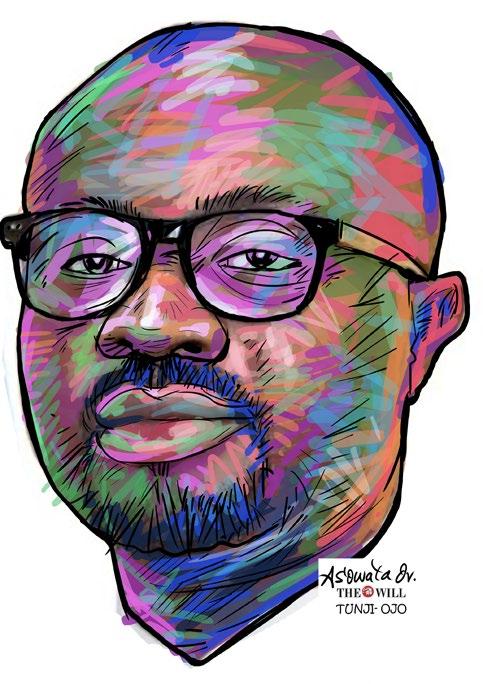
security measures. Many facilities rely on outdated perimeter walls, insufficient surveillance, and understaffed guard posts, making them susceptible to both natural disasters and human intervention. The recurring nature of these escapes is enough to evoke public frustration, with residents in affected areas questioning why the government has not addressed these glaring weaknesses.
Beyond the issue of escapes, Nigeria’s prisons are grappling with a humanitarian crisis driven by overcrowding and deplorable conditions. The NCoS reports that over 50,000 of the country’s 76,000 inmates are awaiting trial, clogging facilities designed for far fewer occupants. Inmates are packed in conditions well beyond capacity, leading to cramped living quarters, inadequate sanitation, and limited access to healthcare. Inmates often endure extreme heat, lack of clean water, and insufficient food.
For female inmates, the situation is particularly dire. Approximately 8,200 women are incarcerated in Nigeria, many of whom are mothers, according to a 2020 National Bureau of Statistics report. These women face heightened risks of genderbased violence, including sexual assault and exploitation, as well as inadequate access to reproductive health services. Pregnant inmates often deliver in unsanitary conditions,

leading to complications that endanger both mother and child. The lack of proper maternal care and basic sanitation exacerbates the plight of female prisoners, who remain a smaller but disproportionately affected segment of the prison population.
The case of Segun Olowookere, sentenced to death in 2014 for stealing hens and eggs in Osun State, illustrates another facet of the crisis: disproportionate sentencing. Olowookere’s case, widely publicised for its severity, sparked outrage and led to a promise of pardon by Osun State’s governor in December 2024. However, thousands of others remain on death row, with Nigeria holding over 3,400 inmates awaiting execution, a sentence that has not been carried out since 2012. The backlog of cases and harsh penalties for minor offenses contribute to the overcrowding that strains facilities to the breaking point.
The Ilesha jailbreak has reignited calls for comprehensive reform of Nigeria’s correctional system. Experts argue that the recurring escapes stem from systemic issues, including chronic underfunding, inadequate staff training, and a lack of political will to address long standing problems. The NCoS has faced criticism for its slow response to these challenges, with some analysts arguing that the agency lacks the resources to implement meaningful change.
Infrastructure upgrades are urgently needed to fortify facilities against environmental and human threats. The Ilesha escape, triggered by a rain-induced wall collapse, underscores the need for climate-resilient designs, especially as Nigeria faces increasing flooding due to climate change. Additionally, addressing overcrowding requires judicial reforms to expedite trials for awaiting-trial inmates, who often languish for years without resolution. Alternative sentencing for non-violent offenders, such as community service, could also alleviate pressure on facilities.
Human rights groups have called for improved conditions, including better sanitation, healthcare, and food for inmates. The plight of female prisoners, in particular, demands targeted interventions, such as dedicated facilities with maternal care units and protection against abuse. The case of Olowookere highlights the need for sentencing reforms to ensure proportionality, particularly for minor offenses that do not warrant lengthy incarceration or capital punishment.
For now, the focus remains on recapturing the seven escapees and preventing further breaches. However, the Ilesha jailbreak serves as a stark reminder that Nigeria’s correctional system is at a breaking point. Without urgent action, investment in infrastructure, judicial reform, and improved conditions for inmates, the nation risks further erosion of public trust and safety. The road to reform is long, but the cost of inaction is far greater.
Beyond the issue of escapes, Nigeria’s prisons are grappling with a humanitarian crisis driven by overcrowding and deplorable conditions.